Commander Legends: Battle for Baldur's Gate Release Notes
Compiled by Jess Dunks
Document last modified April 28, 2022
PDF Download Links:
English | 中國話,漢語;中文 | 中国话,汉语;中文 | Français | Deutsch
Italiano | 한글 | Português | Español | 日本語
The Release Notes include information concerning the release of a new Magic: The Gathering set, as well as a collection of clarifications and rulings involving that set's cards. They're intended to make playing with the new cards more fun by clearing up the common misconceptions and confusion inevitably caused by new mechanics and interactions. As future sets are released, updates to the Magic rules may cause some of this information to become outdated. Go to Magic.Wizards.com/Rules to find the most up-to-date rules.
The "General Notes" section includes information about card legality and explains some of the mechanics and concepts in the set.
The "Card-Specific Notes" sections contain answers to the most important, most common, and most confusing questions players might ask about cards in the set. Items in the "Card-Specific Notes" sections include full card text for your reference. Not all cards in the set are listed.
GENERAL NOTES
Card Legality
Commander Legends: Battle for Baldur's Gate cards with the CLB set code are permitted in the Commander, Legacy, and Vintage formats. Notably, they are not legal in the Standard, Pioneer, or Modern formats.
Go to Magic.Wizards.com/Formats for a complete list of formats and their permitted card sets and banned lists.
Go to Magic.Wizards.com/Commander for more information on the Commander variant.
Go to Locator.Wizards.com to find an event or store near you.
Game Variant: Commander
Created and popularized by fans, Commander is a casual format in which each player's deck is led by that player's commander—traditionally a legendary creature, although some noncreature cards can also be a deck's commander.
Commander is usually played in casual, Free-for-All multiplayer games, although two-player games are also popular. Each player starts at 40 life. Each deck contains exactly 100 cards, including its commander. Commander is also a "singleton" format: other than basic lands, each card must have a different English name.
See the "Game Variant: Commander Draft" section below for modified rules that apply while drafting Commander Legends: Battle for Baldur's Gate.
Go to Magic.Wizards.com/Commander for more information on the Commander variant.
The legendary card chosen as your deck's commander plays a prominent role in games, often appearing on the battlefield multiple times.
- Your commander is normally a legendary creature, but a very small number of legendary cards (including three new cards in this set) have the ability "[This card] can be your commander." A legendary noncreature card can't be chosen as your deck's commander unless it has that ability.
- Your commander begins the game in a separate game area called the command zone. The other cards in your deck are shuffled and become your library.
- While in the command zone, your commander's abilities don't affect the game unless those abilities specifically say they do.
- You may cast your commander from the command zone. Each time you do, it costs {2} more to cast for each time you've previously cast it from the command zone during the game. This additional cost is informally known as the "commander tax."
- If you cast your commander from the command zone for an alternative cost or "without paying its mana cost," the commander tax still applies.
- If your commander would be put into your hand or library from anywhere, you may choose to put it into the command zone instead.
- If your commander would be put into your graveyard or exile, it goes there as normal. The next time state-based actions are performed, if your commander is still in that zone, you may choose to put it into the command zone.
Your commander's color identity determines the other cards that can be in your deck. A card's color identity includes its colors (taking into account its color indicator if it has one), plus the colors of any colored mana symbols in its rules text.
- Color identity is established before the game begins and doesn't change during the game, even if your commander becomes a different color or is in a hidden zone.
- Color words in a card's text don't add to a card's color identity.
- A card can be in your deck if its color identity is part of your commander's color identity. For example, if your commander's color identity is white and blue, your deck may include cards whose color identities are white, blue, or white and blue. It may also include cards with no colors in their color identities.
- A land with a basic land type can't be included in your deck if that basic land type's intrinsic mana ability generates a color of mana outside of your commander's color identity.
In addition to the normal rules regarding winning and losing the game, the Commander format has one other rule: a player who has been dealt 21 or more combat damage by the same commander over the course of the game loses the game.
- Players should keep track of combat damage dealt to them by each commander over the course of the game.
- This rule includes a player's own commander, which can deal combat damage to its owner if it is controlled by another player or if its combat damage gets redirected to its owner.
Unlike two-player games, multiplayer games can continue after a player loses and leaves the game.
- When a player leaves the game, all permanents, spells, and other cards owned by that player also leave the game.
- If that player controlled any abilities or copies of spells that were waiting to resolve, they cease to exist.
- If that player controlled any permanents owned by another player, the effects that gave control of them to the player who left end. If this doesn't give control of those permanents to a different player (most likely because they entered the battlefield under the control of the player who left), they're exiled.
Game Variant: Commander Draft
Commander Draft combines aspects of Booster Draft and Commander. Rather than build a deck beforehand, players draft and build a Commander Draft deck as part of the experience. Each player needs three booster packs to draft. All players should sit around the table in a random order. To begin, each player opens one booster pack. Each player chooses two cards from the pack and puts them face down in front of them, then passes the remaining cards to the player on their left. Each player takes two cards from the pack they were passed and places those cards face down in front of them, forming a single face-down pile of drafted cards. Each player passes the remaining cards to their left, repeating this process until all cards from the first round of booster packs have been drafted. Then players open their second pack, repeating the above procedure, except this time passing cards to the right. For the third booster pack, players once again pass to the left.
The sixty cards each player has drafted form their "card pool." Using those cards (and as many basic lands as desired), each player builds a deck of at least 60 cards, including their commander. As with constructed Commander decks, the deck can include only cards allowed by the color identity of its commander. However, unlike constructed Commander decks, decks in Commander Draft can include more than one copy of any card, so don't be afraid to draft multiples.
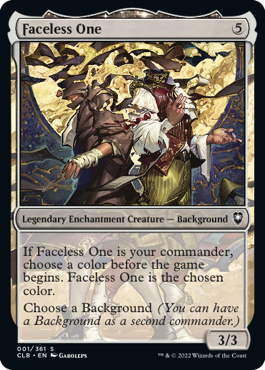
Faceless One
{5}
Legendary Enchantment Creature — Background
3/3
If Faceless One is your commander, choose a color before the game begins. Faceless One is the chosen color.
Choose a Background (You can have a Background as a second commander.)
Although there are a large number of legendary creatures in Commander Legends: Battle for Baldur's Gate, you might get to the end of the draft and realize you don't have the right one to lead your deck. Never fear—Faceless One is here to help. Faceless One appears in place of a common in about one-sixth of Commander Legends: Battle for Baldur's Gate packs. After the draft, you can add up to two copies of Faceless One to your card pool to serve as your deck's commanders. (See "Choose a Background," below.) This means you don't have to draft Faceless One to play with it. If you need it as your commander, you can borrow unused copies from other players in the draft, your own collection, or anywhere else.
The color you choose for Faceless One during deckbuilding will determine its color identity. For example, if you draft red and green cards but don't have a red-green legendary creature, you can use one Faceless One choosing red and another choosing green. If you drafted a green legendary creature with choose a Background or a green Background, you can use that card and a Faceless One choosing red.
Once each player has their deck, they play a traditional Commander game. This draft format is optimized for eight players drafting and then splitting into two games of four players, but there's no wrong way to play!
New Enchantment Type: Background
New Keyword Ability: Choose a Background
One of the fun aspects of creating a character in a game of Dungeons & Dragons is choosing a background for that character. It helps you decide how you'll play that character and what brought them to the present point. Similarly, Background enchantment cards can help define your commander. Each of them grants an ability to commander creatures you own or otherwise modifies their characteristics.
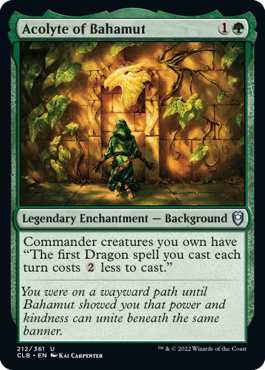
Acolyte of Bahamut
{1}{G}
Legendary Enchantment — Background
Commander creatures you own have "The first Dragon spell you cast each turn costs {2} less to cast."
Some legendary creatures in this set have the choose a Background keyword ability. Choose a background is a variant of the partner ability. It means that you may have two commanders if one of them has choose a Background and the other is a Background card.
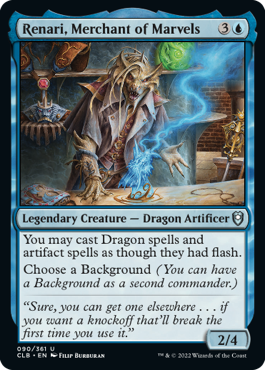
Renari, Merchant of Marvels
{3}{U}
Legendary Creature — Dragon Artificer
2/4
You may cast Dragon spells and artifact spells as though they had flash.
Choose a Background (You can have a Background as a second commander.)
- Although choose a Background is a new variant of the partner ability, the rules for partner have not otherwise changed. Notably, Backgrounds and cards with choose a Background do not interact with cards which have another partner ability.
- One card, Faceless One, both has choose a Background and is itself a Background. In a Commander Draft which uses Commander Legends: Battle for Baldur's Gate booster packs, you may use two copies of Faceless One as your commanders (see "Commander Draft," above). Note that during the game, the "legend rule" will apply to them if they're ever under your control at the same time.
- If your Commander deck has two commanders, you can include only cards whose own color identities are also found in your commanders' combined color identities. If Renari, Merchant of Marvels and Acolyte of Bahamut are your commanders, your deck may contain cards with blue and/or green in their color identity, but not cards with white, black, or red.
- Both commanders start in the command zone, and the remaining 98 cards (or 58 cards in a Commander Draft game) of your deck are shuffled to become your library.
- If your commander loses the choose a Background ability or stops being a Background during the game, as appropriate, it is still your commander.
- Once the game begins, your two commanders are tracked separately. If you cast one, you won't have to pay an additional {2} the first time you cast the other. A player loses the game after having been dealt 21 combat damage from any one of them, not from both of them combined (although your Background won't usually be a creature anyway).
- If something refers to your commander while you have two commanders, it refers to one of them of your choice. If you are instructed to perform an action on your commander (e.g. put it from the command zone into your hand due to Command Beacon), you choose one of your commanders at the time the effect happens.
- An effect that checks whether you control your commander is satisfied if you control one or both of your two commanders.
- You can choose two commanders that are the same color or colors.
- Many cards in Commander Legends: Battle for Baldur's Gate refer to commander creatures you own. A Background isn't normally a creature, so it won't normally be included in such an effect. If another spell or ability causes your Background to become a creature, however, it will be included. Any effect that refers to your commander or a commander you own or control without specifying creature will apply to a Background that is your commander, as appropriate.
- If you control a Background that grants an ability to commander creatures you own, and you own more than one commander creature, each of them will have that ability. This means, for example, that if you control Acolyte of Bahamut along with two commander creatures you own, the first Dragon spell you cast each turn costs {4} less to cast.
New Keyword Action: Venture into Undercity
This set brings with it a new dungeon, called Undercity. Undercity works a bit differently than previous dungeon cards. You can only venture into Undercity with the initiative (see below).
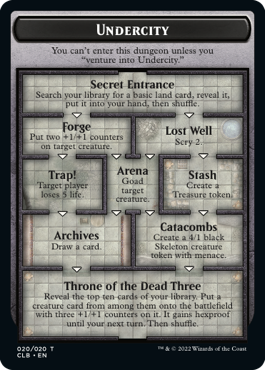
Undercity
Dungeon — Undercity
You can't enter this dungeon unless you "venture into Undercity."
Secret Entrance — Search your library for a basic land card, reveal it, put it into your hand, then shuffle. (Leads to: Forge, Lost Well)
Forge — Put two +1/+1 counters on target creature. (Leads to: Trap!, Arena)
Lost Well — Scry 2. (Leads to: Arena, Stash)
Trap! — Target player loses 5 life. (Leads to: Archives)
Arena — Goad target creature. (Leads to: Archives, Catacombs)
Stash — Create a Treasure token. (Leads to: Catacombs)
Archives — Draw a card. (Leads to: Throne of the Dead Three)
Catacombs — Create a 4/1 black Skeleton creature token with menace. (Leads to: Throne of the Dead Three)
Throne of the Dead Three — Reveal the top ten cards of your library. Put a creature card from among them onto the battlefield with three +1/+1 counters on it. It gains hexproof until your next turn. Then shuffle.
Notes on Undercity
- You cannot venture into Undercity unless instructed to do so, either because you have the initiative at the beginning of your upkeep or because you take the initiative. Notably, if you aren't in a dungeon and an effect instructs you to venture into the dungeon (not venture into Undercity), you can't start Undercity.
- Similarly, when instructed to venture into Undercity, you can't start a dungeon that isn't Undercity.
- If you aren't in a dungeon when instructed to venture into Undercity, you will put Undercity into the command zone and move your venture marker to Secret Entrance (the first room).
- If you're already in a dungeon when instructed to venture into Undercity, you move to the next room of that dungeon. If you are already in the last room, you will complete that dungeon and start Undercity. This is true whether you're already in Undercity or any other dungeon.
General dungeon notes
- The rules for dungeons and venture into the dungeon haven't changed significantly since they last appeared.
- Dungeons are put into the command zone from outside the game. You use a venture marker to track your progress through them. Each dungeon includes a series of rooms. Each room has a triggered ability, the effect of which is printed in that room. That ability is "When you move your venture marker into this room, [effect]."
- After you move your venture marker into the last room of a dungeon and that room's ability resolves (or otherwise leaves the stack), the dungeon leaves the game and you have now completed it.
- Some cards care about whether you've completed a dungeon or have an ability that triggers whenever you complete a dungeon. These abilities work the same way whether the dungeon you have completed is Undercity or another dungeon.
- Whenever a player starts a dungeon (whether via venture into the dungeon or venture into Undercity), no player can respond until after that player has entered the dungeon and its first room ability has triggered.
The Initiative
Some cards in this set instruct a player to take the initiative. The initiative is a designation a player can have (much like the monarch). A player with the initiative designation is said to "have the initiative." The initiative carries two inherent rules. First, whenever a player takes the initiative, and at the beginning of the upkeep of the player with the initiative, that player ventures into Undercity. Second, whenever one or more creatures a player controls deal combat damage to the player who has the initiative, the first player takes the initiative. Also, some abilities will refer to having the initiative and provide other benefits.
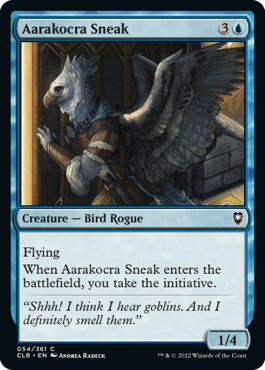
Aarakocra Sneak
{3}{U}
Creature — Bird Rogue
1/4
Flying
When Aarakocra Sneak enters the battlefield, you take the initiative.
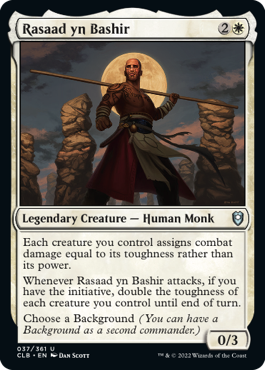
Rasaad yn Bashir
{2}{W}
Legendary Creature — Human Monk
0/3
Each creature you control assigns combat damage equal to its toughness rather than its power.
Whenever Rasaad yn Bashir attacks, if you have the initiative, double the toughness of each creature you control until end of turn.
Choose a Background (You can have a Background as a second commander.)
- There is no initiative in a game until an effect instructs a player to take the initiative. Once a player is instructed to do this, they have the initiative until another player takes the initiative.
- Only one player can have the initiative at a time. As one player takes the initiative, any other player that had the initiative ceases to have it.
- A player who currently has the initiative may take the initiative again. This causes that player to venture into Undercity again, but does not cause them to have multiple initiative designations.
- If the player with the initiative leaves the game, the active player takes the initiative at the same time that player leaves the game. If the active player is leaving the game or if there is no active player, the next player in turn order takes the initiative.
- In a Two-Headed Giant game, if both players on a team deal combat damage to the player that has the initiative at the same time, the player with the initiative will choose the order of the triggered abilities. Then, as those abilities resolve, one team member takes the initiative (and ventures into Undercity) and then the other team member does the same. The last player to take the initiative keeps it until the initiative changes again.
Returning mechanic: Adventurer cards
Adventures return to tell the story of Baldur's Gate. Just as before, adventurer cards are permanent cards, but each one has an Adventure, a set of alternative characteristics in a subset frame on the left side of its text box. You may cast the card as its Adventure—if you do, you can cast it as a permanent later. What's new in this set is that not all adventurer cards are creature cards! They now appear on other types of permanent cards as well.
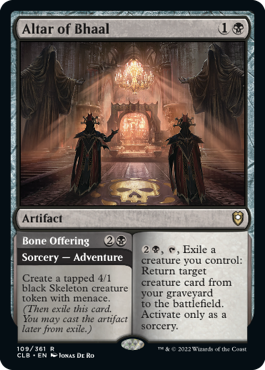
Altar of Bhaal
{1}{B}
Artifact
{2}{B}, {T}, Exile a creature you control: Return target creature card from your graveyard to the battlefield. Activate only as a sorcery.
//
Bone Offering
{2}{B}
Sorcery — Adventure
Create a tapped 4/1 black Skeleton creature token with menace. (Then exile this card. You may cast the artifact later from exile.)
- An adventurer card is a permanent card in every zone except the stack, as well as while on the stack if not cast as an Adventure. Ignore its alternative characteristics in those cases. For example, while it's in your graveyard, Altar of Bhaal is an artifact card whose mana value is 2.
- When casting a spell as an Adventure, use the alternative characteristics and ignore all of the card's normal characteristics. The spell's color, mana cost, mana value, and so on are determined by only those alternative characteristics. If the spell leaves the stack, it immediately resumes using its normal characteristics.
- If you cast an adventurer card as an Adventure, use only its alternative characteristics to determine whether it's legal to cast that spell.
- If a spell is cast as an Adventure, its controller exiles it instead of putting it into its owner's graveyard as it resolves. For as long as it remains exiled, that player may cast it as a permanent spell. If an Adventure spell leaves the stack in any way other than resolving (most likely by being countered or by failing to resolve because its targets have all become illegal), that card won't be exiled and the spell's controller won't be able to cast it as a permanent later.
- If an adventurer card ends up in exile for any other reason than by exiling itself while resolving, it won't give you permission to cast it as a permanent spell.
- You must still follow any relevant timing rules for the permanent spell you cast from exile. Normally, you'll be able to cast it only during your main phase while the stack is empty.
- If an effect copies an Adventure spell, that copy is exiled as it resolves. It ceases to exist as a state-based action; it's not possible to cast the copy from exile.
- An effect may refer to a card, spell, or permanent that "has an Adventure." This refers to a card, spell, or permanent that has an adventurer card's set of alternative characteristics, even if they're not being used and even if that card was never cast as an Adventure.
- If an object becomes a copy of an object that has an Adventure, the copy also has an Adventure. If it changes zones, it will either cease to exist (if it's a token) or cease to be a copy (if it's a nontoken permanent), and so you won't be able to cast it as an Adventure.
- If an effect instructs you to choose a card name, you may choose the alternative Adventure name. Consider only the alternative characteristics to determine whether that is an appropriate name to choose.
- Casting a card as an Adventure isn't casting it for an alternative cost. Effects that allow you to cast a spell for an alternative cost or without paying its mana cost may allow you to apply those to the Adventure.
Returning Mechanic: Rolling Dice
In Adventures in the Forgotten Realms, we introduced dice-rolling to black-bordered Magic for the first time, and it returns here. Many cards instruct you to roll dice and then tell you what to do based on the result. Some cards have abilities that trigger whenever you roll dice or whenever you roll a certain result. Some other cards modify die rolls.
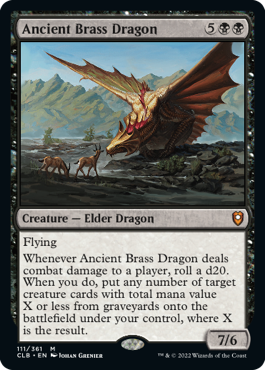
Ancient Brass Dragon
{5}{B}{B}
Creature — Elder Dragon
7/6
Flying
Whenever Ancient Brass Dragon deals combat damage to a player, roll a d20. When you do, put any number of target creature cards with total mana value X or less from graveyards onto the battlefield under your control, where X is the result.
- Each die is identified by the number of faces it has. For example, a d20 is a twenty-sided die. Each die must have equally likely outcomes and the roll must be fair. Although physical dice are recommended, digital substitutes are allowed, provided they have the same number of equally likely outcomes as specified in the original roll instruction.
- An ability that tells you to roll a die will also specify what to do with the result of that roll. Most often, this is in the form of a "results table" in the card text.
- The instruction to roll a die and the effect that occurs because of the result are usually all part of the same ability. Players do not get the chance to respond to the ability after knowing the result of the roll. However, if a separate ability triggers after the die roll, as is the case with Ancient Brass Dragon's ability, players will know the result of the die roll as that reflexive triggered ability is put on the stack and its targets are chosen.
- An effect that says "choose a target, then roll a d20" or similar still uses the normal process of putting an ability on the stack and resolving it. Choosing targets is part of putting the ability on the stack and rolling the d20 happens later, as the ability resolves.
- Some effects may modify the result of a die roll. This may be part of the instruction to roll a die or it may come from other cards. Anything that references the "result" of a die roll is looking for the result after these modifications. Anything that is looking for the "natural result" is looking for the number shown on the face of the die before these modifications.
- Some abilities, like that of Pixie Guide and Barbarian Class, replace rolling a die with rolling extra dice and ignoring the lowest roll. The ignored rolls are not considered for the effect that instructed you to roll a die, and do not cause abilities to trigger. For all intents and purposes, once you determine which dice count, the extra dice were never rolled.
- Some effects instruct you to roll again. This uses the same number and type of dice as the original roll, and that roll will use the same set of possible outcomes.
- While playing Planechase, rolling the planar die will cause any ability that triggers whenever a player rolls one or more dice to trigger. However, any effect that refers to a numerical result will ignore the rolling of the planar die.
Returning Mechanic: Myriad
Myriad is a triggered ability that effectively lets a creature attack in all possible directions.
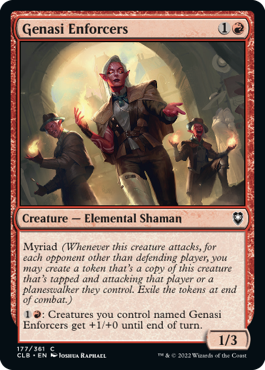
Genasi Enforcers
{1}{R}
Creature — Elemental Shaman
1/3
Myriad (Whenever this creature attacks, for each opponent other than defending player, you may create a token that's a copy of this creature that's tapped and attacking that player or a planeswalker they control. Exile the tokens at end of combat.)
{1}{R}: Creatures you control named Genasi Enforcers get +1/+0 until end of turn.
- The term "defending player" in the myriad rules (or any other ability of an attacking creature) refers to the player the creature with myriad was attacking or the controller of the planeswalker it was attacking at the time the ability resolves. If that creature is no longer attacking, it refers to the player it was last attacking or the controller of the planeswalker it was last attacking.
- If the defending player is your only opponent, no tokens are put onto the battlefield.
- You choose whether each token is attacking the player or a planeswalker they control as the token is created. If it's attacking a planeswalker, you choose which one.
- Although the tokens enter the battlefield attacking, they were never declared as attackers. Abilities that trigger whenever a creature attacks won't trigger, including the myriad ability of the tokens. If there are any costs to have a creature attack, those costs won't apply to the tokens.
- The tokens all enter the battlefield at the same time.
- Each token copies exactly what was printed on the original creature and nothing else. It doesn't copy whether that creature is tapped or untapped, whether it has any counters on it or Auras and Equipment attached to it, or any non-copy effects that have changed its power, toughness, types, color, and so on.
- Any enters-the-battlefield abilities of the copied creature will trigger when the tokens enter the battlefield. Any "as [this permanent] enters the battlefield" or "[this permanent] enters the battlefield with" abilities of the copied creature will also work.
- If myriad creates more than one token for any given player (due to an effect such as the one Doubling Season creates), you may choose separately for each token whether it's attacking the player or a planeswalker they control.
COMMANDER LEGENDS: BATTLE FOR BALDUR'S GATE CARD-SPECIFIC NOTES
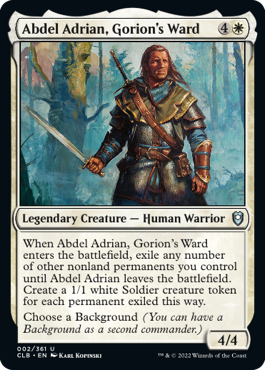
Abdel Adrian, Gorion's Ward
{4}{W}
Legendary Creature — Human Warrior
4/4
When Abdel Adrian, Gorion's Ward enters the battlefield, exile any number of other nonland permanents you control until Abdel Adrian leaves the battlefield. Create a 1/1 white Soldier creature token for each permanent exiled this way.
Choose a Background (You can have a Background as a second commander.)
- The Soldier creature tokens stay on the battlefield even after the exiled cards return.
- If Abdel Adrian leaves the battlefield before its enters-the-battlefield ability resolves, you can't exile any nonland permanents. You won't create any Soldier creature tokens in this case.
- If you exile a token nonland permanent this way, it ceases to exist. It won't be returned to the battlefield. You'll still create a Soldier creature token for it though.
- Cards that return to the battlefield after Abdel Adrian leaves the battlefield return under their owners' control.
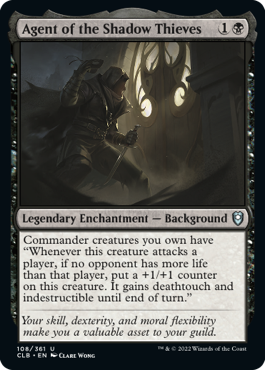
Agent of the Shadow Thieves
{1}{B}
Legendary Enchantment — Background
Commander creatures you own have "Whenever this creature attacks a player, if no opponent has more life than that player, put a +1/+1 counter on this creature. It gains deathtouch and indestructible until end of turn."
- The ability granted by Agent of the Shadow Thieves is looking to see if any of the attacking player's opponents have a higher life total than that defending player. The attacking player's life total is not included in this comparison.
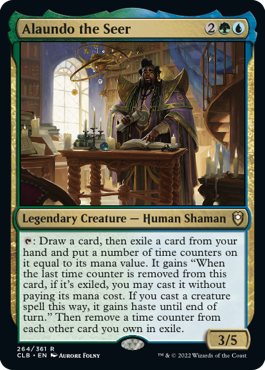
Alaundo the Seer
{2}{G}{U}
Legendary Creature — Human Shaman
3/5
{T}: Draw a card, then exile a card from your hand and put a number of time counters on it equal to its mana value. It gains "When the last time counter is removed from this card, if it's exiled, you may cast it without paying its mana cost. If you cast a creature spell this way, it gains haste until end of turn." Then remove a time counter from each other card you own in exile.
- Alaundo's ability is not the same as the suspend ability. However, if you exile a card with suspend this way, the suspend ability will also cause you to remove time counters from it.
- Alaundo's ability will remove time counters from all cards you own in exile, even ones that were put there another way, such as with the suspend ability.
- If you exile a card with a mana value of 0, such as a land card, no time counters will be placed on it. Unless you find a way to put time counters on it in exile, the triggered ability it gains from Alaundo will never trigger.
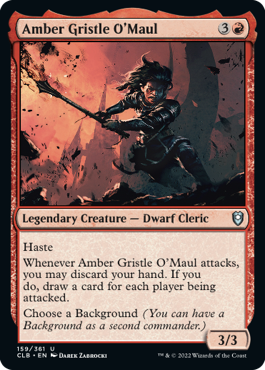
Amber Gristle O'Maul
{3}{R}
Legendary Creature — Dwarf Cleric
3/3
Haste
Whenever Amber Gristle O'Maul attacks, you may discard your hand. If you do, draw a card for each player being attacked.
Choose a Background (You can have a Background as a second commander.)
- You decide whether to discard your hand as Amber Gristle O'Maul's ability resolves. No player may respond after you have decided to discard your hand but before you have drawn cards.
- You may choose to discard your hand even if it is empty. Especially if it is empty.
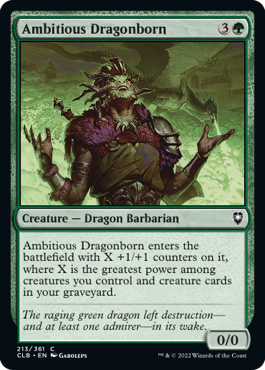
Ambitious Dragonborn
{3}{G}
Creature — Dragon Barbarian
0/0
Ambitious Dragonborn enters the battlefield with X +1/+1 counters on it, where X is the greatest power among creatures you control and creature cards in your graveyard.
- Ambitious Dragonborn is not yet on the battlefield when its effect looks for the creature or creature card with the greatest power, so any creatures that have a bonus to their power based on the number of creatures on the battlefield won't count it until after it enters with counters.
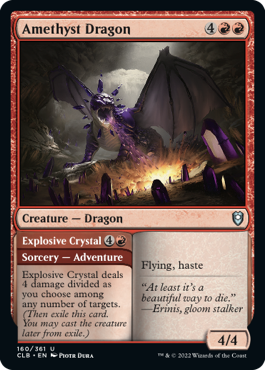
Amethyst Dragon
{4}{R}{R}
Creature — Dragon
4/4
Flying, haste
//
Explosive Crystal
{4}{R}
Sorcery — Adventure
Explosive Crystal deals 4 damage divided as you choose among any number of targets. (Then exile this card. You may cast the creature later from exile.)
- You choose how many targets Explosive Crystal has and how the damage is divided as you put the spell on the stack. Each target must receive at least 1 damage.
- If some of the targets are illegal as Explosive Crystal tries to resolve, the original division of damage still applies and the damage that would have been dealt to the illegal targets is lost. It won't be dealt instead to a legal target.
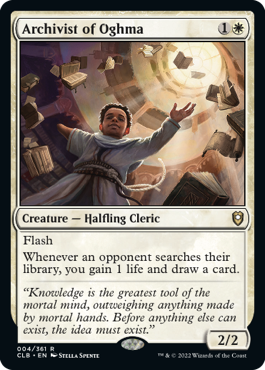
Archivist of Oghma
{1}{W}
Creature — Halfling Cleric
2/2
Flash
Whenever an opponent searches their library, you gain 1 life and draw a card.
- Archivist of Oghma's triggered ability won't be put onto the stack until after the spell or ability causing the opponent to search their library finishes resolving. Notably, if that spell or ability causes any other abilities to trigger (for example, if the opponent searched for a card and put it onto the battlefield), those abilities and Archivist of Oghma's triggered ability will go on the stack at the same time. The active player puts all their abilities on the stack in any order, then each other player in turn order does the same. The last ability put onto the stack this way resolves first, and so on.
- Archivist of Oghma's triggered ability won't trigger if you search an opponent's library or an opponent searches another player's library.
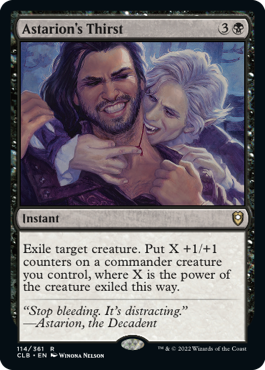
Astarion's Thirst
{3}{B}
Instant
Exile target creature. Put X +1/+1 counters on a commander creature you control, where X is the power of the creature exiled this way.
- Use the creature's power as it last existed on the battlefield to determine the value of X.
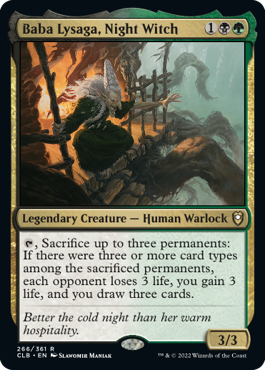
Baba Lysaga, Night Witch
{1}{B}{G}
Legendary Creature — Human Warlock
3/3
{T}, Sacrifice up to three permanents: If there were three or more card types among the sacrificed permanents, each opponent loses 3 life, you gain 3 life, and you draw three cards.
- You may sacrifice permanents that aren't different card types to pay the cost of Baba Lysaga's activated ability, but if you do, it will have no effect.
- Check the types of those permanents as they last existed on the battlefield to see if there were three or more card types among the sacrificed permanents.
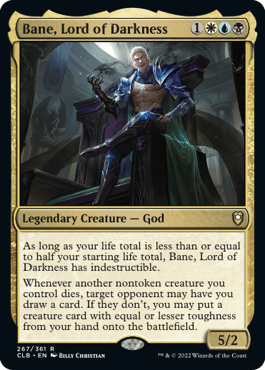
Bane, Lord of Darkness
{1}{W}{U}{B}
Legendary Creature — God
5/2
As long as your life total is less than or equal to half your starting life total, Bane, Lord of Darkness has indestructible.
Whenever another nontoken creature you control dies, target opponent may have you draw a card. If they don't, you may put a creature card with equal or lesser toughness from your hand onto the battlefield.
- If Bane, Lord of Darkness is dealt lethal damage at the same time that its controller's life total is reduced to less than or equal to half their starting life total, Bane will have indestructible at the time state-based actions are performed and survive.
- Bane's last ability looks at the toughness of the creature that died, not Bane's toughness.
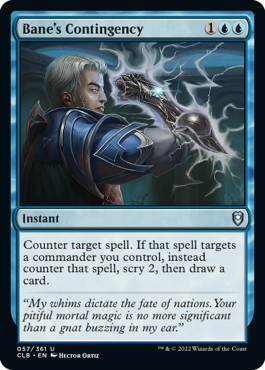
Bane's Contingency
{1}{U}{U}
Instant
Counter target spell. If that spell targets a commander you control, instead counter that spell, scry 2, then draw a card.
- A "commander you control" means a permanent on the battlefield that is a commander and is under your control. It can be your commander or one owned by another player. It doesn't refer to your commander in any other zone. Notably, if a player uses Bane's Contingency to counter a spell that would counter their commander, they do not scry or draw a card.
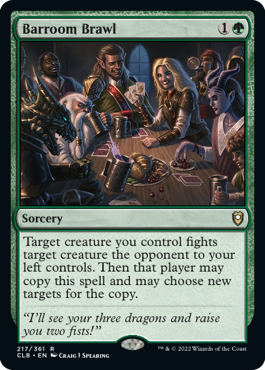
Barroom Brawl
{1}{G}
Sorcery
Target creature you control fights target creature the opponent to your left controls. Then that player may copy this spell and may choose new targets for the copy.
- Each copy of Barroom Brawl also includes the opportunity to create a copy, so as long as there are legal targets available and the copies keep successfully resolving, the brawl can continue.
- The opponent to your left may choose the creature they control that was part of the original fight as the first target for their copy, even if it would die after the original spell is done resolving. If it does die, however, it will be an illegal target as the copy tries to resolve.
- If one target is legal and the other is not legal as Barroom Brawl resolves, neither creature will deal damage. However, the opponent to your left may still choose to copy Barroom Brawl.
- If both targets are illegal as Barroom Brawl attempts to resolve, it does nothing. No copy will be created.
- In a two-player game, the other player is the opponent to your left.
- If the opponent to your left chooses to copy Barroom Brawl but not change its targets, both targets will probably be illegal as the copy tries to resolve (at a minimum, both targets would have to survive and switch controllers in response to still be legal targets for the copy), and the player to their left will not be able to copy it.
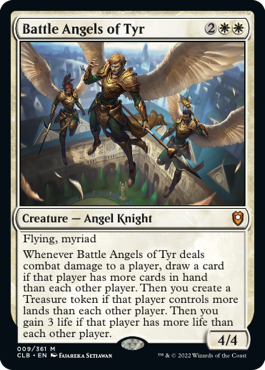
Battle Angels of Tyr
{2}{W}{W}
Creature — Angel Knight
4/4
Flying, myriad
Whenever Battle Angels of Tyr deals combat damage to a player, draw a card if that player has more cards in hand than each other player. Then you create a Treasure token if that player controls more lands than each other player. Then you gain 3 life if that player has more life than each other player.
- Each condition is checked as the triggered ability resolves, not when it is placed on the stack.
- Each condition is checked, even if you don't get the benefit of one or more of them. You can create a Treasure token even if you didn't draw a card, for example.
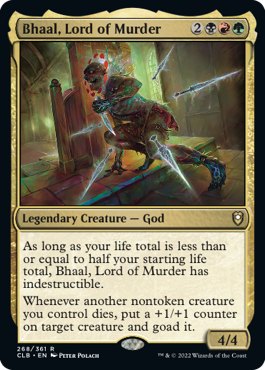
Bhaal, Lord of Murder
{2}{B}{R}{G}
Legendary Creature — God
4/4
As long as your life total is less than or equal to half your starting life total, Bhaal, Lord of Murder has indestructible.
Whenever another nontoken creature you control dies, put a +1/+1 counter on target creature and goad it.
- If Bhaal, Lord of Murder is dealt lethal damage at the same time that its controller's life total is reduced to less than or equal to half their starting life total, Bhaal will have indestructible at the time state-based actions are performed and survive.
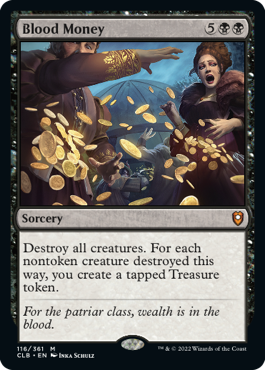
Blood Money
{5}{B}{B}
Sorcery
Destroy all creatures. For each nontoken creature destroyed this way, you create a tapped Treasure token.
- If a creature isn't destroyed this way for some reason, such as having indestructible or being regenerated, Blood Money's controller will not create a Treasure token for it.
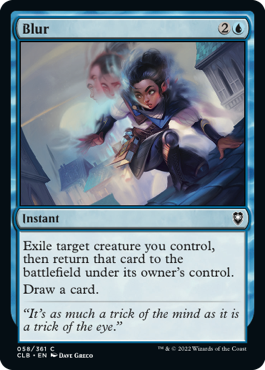
Blur
{2}{U}
Instant
Exile target creature you control, then return that card to the battlefield under its owner's control.
Draw a card.
- When the card returns to the battlefield, it will be a new object with no connection to the card that was exiled. Auras attached to the exiled creature will be put into their owners' graveyards. Any Equipment will become unattached and remain on the battlefield. Any counters on the exiled creature will cease to exist.
- If a token is exiled this way, it will cease to exist and won't return to the battlefield.
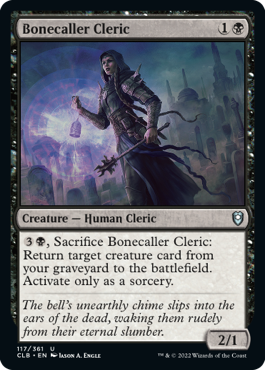
Bonecaller Cleric
{1}{B}
Creature — Human Cleric
2/1
{3}{B}, Sacrifice Bonecaller Cleric: Return target creature card from your graveyard to the battlefield. Activate only as a sorcery.
- Bonecaller Cleric can't be the target of its own ability. This is because targets are chosen for activated abilities before costs (such as "Sacrifice Bonecaller Cleric") are paid.
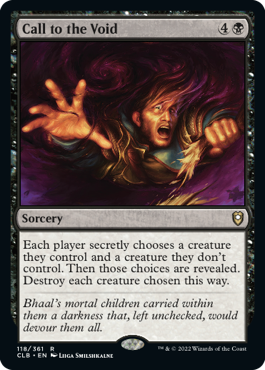
Call to the Void
{4}{B}
Sorcery
Each player secretly chooses a creature they control and a creature they don't control. Then those choices are revealed. Destroy each creature chosen this way.
- For each player to secretly choose the creatures, that player should write down their choices without showing them to anyone else. Each player then keeps their choices secret until all players simultaneously reveal their choices.
- If a creature is chosen more than once, it is destroyed only once. For example, having a single shield counter on it would allow it to survive.
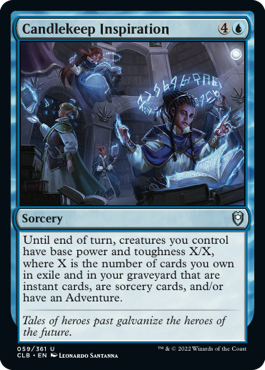
Candlekeep Inspiration
{4}{U}
Sorcery
Until end of turn, creatures you control have base power and toughness X/X, where X is the number of cards you own in exile and in your graveyard that are instant cards, are sorcery cards, and/or have an Adventure.
- The value of X is locked in at the time that Candlekeep Inspiration resolves. The power and toughness of creatures affected by it will not change as cards enter and leave exile and/or your graveyard.
- The set of creatures that Candlekeep Inspiration applies to is locked in as it resolves. Creatures that enter the battlefield under your control after it resolves will not be affected.
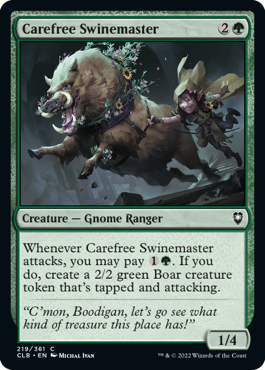
Carefree Swinemaster
{2}{G}
Creature — Gnome Ranger
1/4
Whenever Carefree Swinemaster attacks, you may pay {1}{G}. If you do, create a 2/2 green Boar creature token that's tapped and attacking.
- While resolving Carefree Swinemaster's triggered ability, you can't pay the cost multiple times to create more than one token.
- You choose which player or planeswalker is being attacked by the Boar token as it enters the battlefield. It doesn't have to be the same player or planeswalker that Carefree Swinemaster is attacking.
- Although the token created is an attacking creature, it was never declared as an attacking creature. This means that abilities that trigger whenever a creature attacks won't trigger when it enters the battlefield attacking.
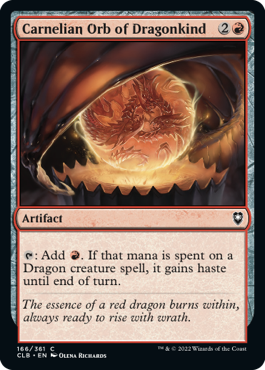
Carnelian Orb of Dragonkind
{2}{R}
Artifact
{T}: Add {R}. If that mana is spent on a Dragon creature spell, it gains haste until end of turn.
- The mana created by Carnelian Orb of Dragonkind can be spent on anything, not just Dragon creature spells.
- If the mana from Carnelian Orb of Dragonkind is spent to pay any part of the Dragon creature spell's cost, including an alternative or additional cost, the Dragon will gain haste until end of turn.
- An instant or sorcery spell is not a creature spell, even if that spell creates Dragon creature tokens.
- If the mana is spent on a non-Dragon spell that becomes a Dragon later in the turn, that creature won't have haste.
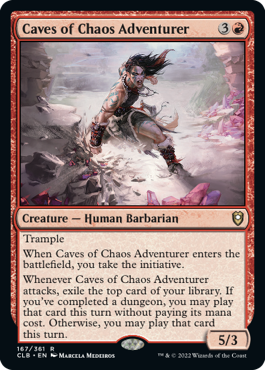
Caves of Chaos Adventurer
{3}{R}
Creature — Human Barbarian
5/3
Trample
When Caves of Chaos Adventurer enters the battlefield, you take the initiative.
Whenever Caves of Chaos Adventurer attacks, exile the top card of your library. If you've completed a dungeon, you may play that card this turn without paying its mana cost. Otherwise, you may play that card this turn.
- Caves of Chaos Adventurer's last ability checks to see if you've completed a dungeon at the time you exile a card. If you haven't completed a dungeon at that time, you can't cast it without paying its mana cost, even if you complete a dungeon later during the same turn.
- If you have completed a dungeon when Caves of Chaos Adventurer's last ability resolves, you can only play the exiled card without paying its mana cost. You can't choose to play it normally.
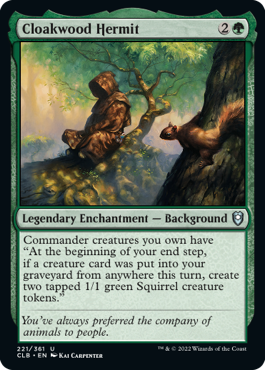
Cloakwood Hermit
{2}{G}
Legendary Enchantment — Background
Commander creatures you own have "At the beginning of your end step, if a creature card was put into your graveyard from anywhere this turn, create two tapped 1/1 green Squirrel creature tokens."
- The ability Cloakwood Hermit grants triggers if you control a creature with that ability as the end step begins and a creature card was put into your graveyard from anywhere this turn. This is true even if no creatures had this ability at the time the creature card went to the graveyard or the creature card is no longer in your graveyard as your end step begins.
- Notably, this means that if your commander creature dies and you choose to return it to the command zone from the graveyard, then cast it again the same turn, the ability granted to it by Cloakwood Hermit will trigger at the beginning of that turn's end step.
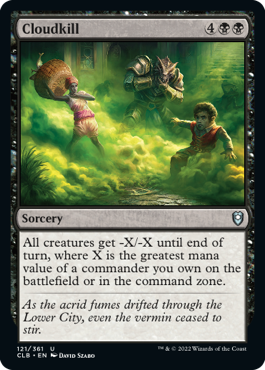
Cloudkill
{4}{B}{B}
Sorcery
All creatures get -X/-X until end of turn, where X is the greatest mana value of a commander you own on the battlefield or in the command zone.
- If your commander is under the control of another player as Cloudkill resolves, it is still on the battlefield and will still be used to determine the value of X.
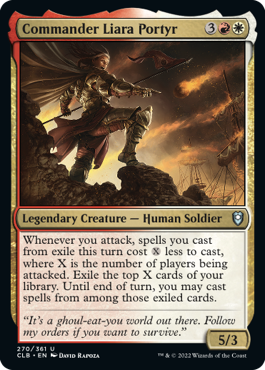
Commander Liara Portyr
{3}{R}{W}
Legendary Creature — Human Soldier
5/3
Whenever you attack, spells you cast from exile this turn cost {X} less to cast, where X is the number of players being attacked. Exile the top X cards of your library. Until end of turn, you may cast spells from among those exiled cards.
- Commander Liara Portyr's triggered ability reduces the cost of all spells you cast from exile, even if you are casting them with a different permission. For example, if you are casting an exiled permanent spell with an Adventure in the same turn that this triggered ability resolved, it would cost {X} less to cast.
- If you attack a planeswalker but don't also attack that planeswalker's controller, that player won't count toward the value of X.
- Commander Liara Portyr doesn't have to be among the attacking creatures.
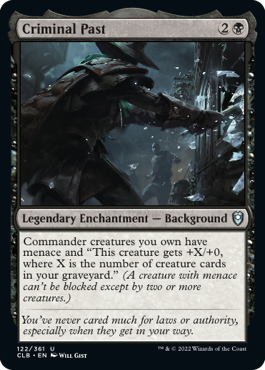
Criminal Past
{2}{B}
Legendary Enchantment — Background
Commander creatures you own have menace and "This creature gets +X/+0, where X is the number of creature cards in your graveyard." (A creature with menace can't be blocked except by two or more creatures.)
- If an opponent controls a commander creature you own while you control Criminal Past, X will be the number of creatures cards in that player's graveyard, not yours.
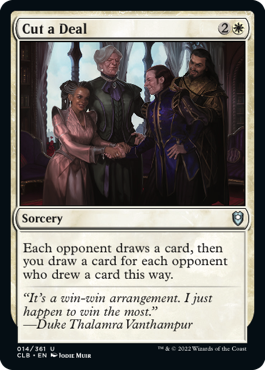
Cut a Deal
{2}{W}
Sorcery
Each opponent draws a card, then you draw a card for each opponent who drew a card this way.
- Although the draws are not optional, if an opponent doesn't draw a card, perhaps because a replacement effect replaced the draw with another effect, that player is not counted when determining how many cards you draw.
- If an opponent drew more than one card this way due to a replacement effect, you still draw only one card for that player.
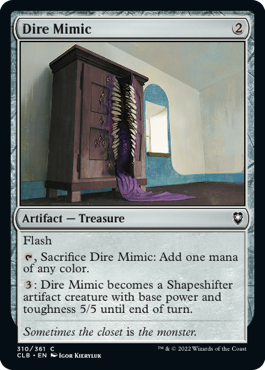
Dire Mimic
{2}
Artifact — Treasure
Flash
{T}, Sacrifice Dire Mimic: Add one mana of any color.
{3}: Dire Mimic becomes a Shapeshifter artifact creature with base power and toughness 5/5 until end of turn.
- If an effect refers to a Treasure, it means any Treasure artifact, not just a Treasure artifact token.
- Dire Mimic is still a Treasure after its last ability resolves, but Treasure is an artifact type, never a creature type.
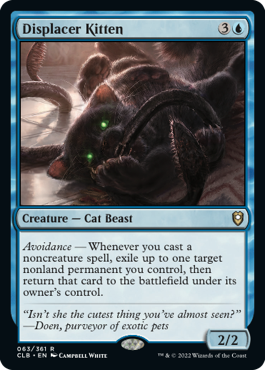
Displacer Kitten
{3}{U}
Creature — Cat Beast
2/2
Avoidance — Whenever you cast a noncreature spell, exile up to one target nonland permanent you control, then return that card to the battlefield under its owner's control.
- When the card returns to the battlefield, it will be a new object with no connection to the card that was exiled. Auras attached to the exiled creature will be put into their owners' graveyards. Any Equipment will become unattached and remain on the battlefield. Any counters on the exiled permanent will cease to exist.
- If a token is exiled this way, it will cease to exist and won't return to the battlefield.
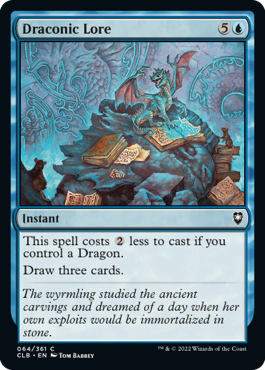
Draconic Lore
{5}{U}
Instant
This spell costs {2} less to cast if you control a Dragon.
Draw three cards.
- The cost of Draconic Lore is determined and locked in as you cast it before any mana abilities are activated and before any player can respond. Notably, this means that no player can respond to remove your Dragon before the cost is reduced, and if you sacrifice that Dragon as part of a mana ability, the cost won't be increased.
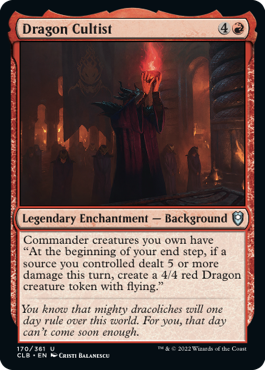
Dragon Cultist
{4}{R}
Legendary Enchantment — Background
Commander creatures you own have "At the beginning of your end step, if a source you controlled dealt 5 or more damage this turn, create a 4/4 red Dragon creature token with flying."
- The triggered ability granted by Dragon Cultist looks for the total amount of damage dealt by a single source, even if that damage wasn't dealt all at once or wasn't dealt to the same player or permanent. For example, if an attacking 3/3 creature with double strike deals 3 damage to one blocker in the first combat damage step and 3 damage to another blocker in the second combat damage step, then it has dealt a total of 6 damage and will cause this ability to trigger.
- You need to control the source that dealt damage only at the time that the damage was dealt. If it dies or changes control after that point, this ability will still trigger at the beginning of your end step as long as you control a commander creature with the ability.
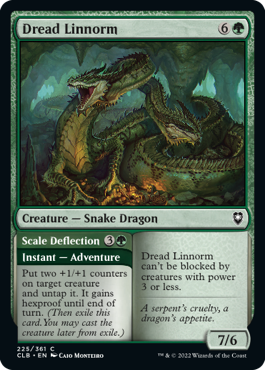
Dread Linnorm
{6}{G}
Creature — Snake Dragon
7/6
Dread Linnorm can't be blocked by creatures with power 3 or less.
//
Scale Deflection
{3}{G}
Instant — Adventure
Put two +1/+1 counters on target creature and untap it. It gains hexproof until end of turn. (Then exile this card. You may cast the creature later from exile.)
- Reducing a creature's power to 3 or less after it has blocked Dread Linnorm won't cause it to become unblocked.
- Scale Deflection can target an untapped creature. If the target creature is untapped as Scale Deflection resolves, you will still put two +1/+1 counters on it and it will still gain hexproof.
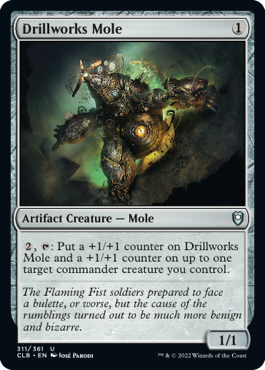
Drillworks Mole
{1}
Artifact Creature — Mole
1/1
{2}, {T}: Put a +1/+1 counter on Drillworks Mole and a +1/+1 counter on up to one target commander creature you control.
- If you target a commander creature with Drillworks Mole's activated ability and that creature is no longer a legal target as the ability resolves, you will not put a +1/+1 counter on Drillworks Mole. Conversely, if the target is still legal, you will put a counter on the commander creature you control, even if Drillworks Mole is no longer on the battlefield as the ability resolves.
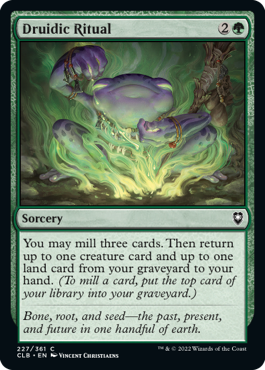
Druidic Ritual
{2}{G}
Sorcery
You may mill three cards. Then return up to one creature card and up to one land card from your graveyard to your hand. (To mill a card, put the top card of your library into your graveyard.)
- If you have fewer than three cards in your library, you can't choose to mill any cards this way.
- The creature and/or land card you return doesn't need to be one of the cards you just milled. It can be any card that is in your graveyard at that time.
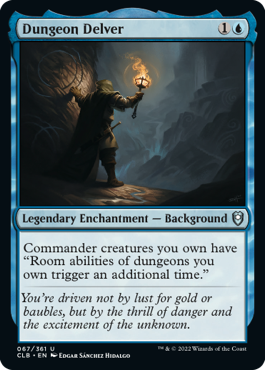
Dungeon Delver
{1}{U}
Legendary Enchantment — Background
Commander creatures you own have "Room abilities of dungeons you own trigger an additional time."
- The ability Dungeon Delver grants causes the same room you ventured into to trigger an additional time. It does not cause you to move to the next room.
- If you control more than one permanent with this ability, or a permanent with multiple instances of this ability, the room triggers that many additional times. For example, if you control Hama Pashar, Ruin Seeker; Dungeon Delver; and a commander creature you own, room abilities of dungeons you own trigger two additional times.
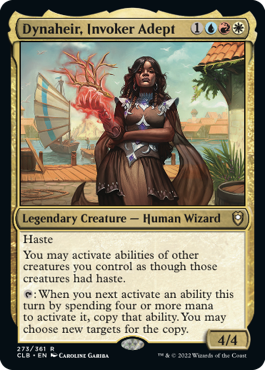
Dynaheir, Invoker Adept
{1}{U}{R}{W}
Legendary Creature — Human Wizard
4/4
Haste
You may activate abilities of other creatures you control as though those creatures had haste.
{T}: When you next activate an ability that isn't a mana ability this turn by spending four or more mana to activate it, copy that ability. You may choose new targets for the copy.
- Dynaheir, Invoker Adept doesn't actually grant haste to creatures you control, nor does it let you attack with them as though they had haste.
- Dynaheir has received an update to its Oracle text. Specifically, the delayed triggered ability doesn't trigger if you activate a mana ability that costs four or more mana to activate.
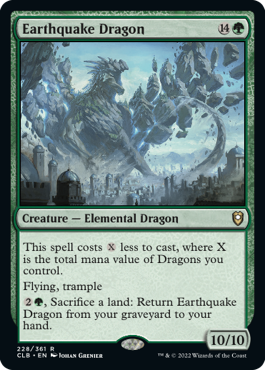
Earthquake Dragon
{14}{G}
Creature — Elemental Dragon
10/10
This spell costs {X} less to cast, where X is the total mana value of Dragons you control.
Flying, trample
{2}{G}, Sacrifice a land: Return Earthquake Dragon from your graveyard to your hand.
- If a permanent has {X} in its mana cost, X is 0 when calculating its mana value.
- The total cost to cast Earthquake Dragon is locked in before you pay that cost. For example, if you control three Dragons, each with mana value 4, including one you can sacrifice to add {C}, the total cost of Earthquake Dragon is {2}{G}. Then you can sacrifice the Dragon as you activate mana abilities just before paying the cost.
- If the total mana value of Dragons you control is 14 or greater, Earthquake Dragon costs {G} to cast.
- Once a player has announced that they are casting Earthquake Dragon, no player may take actions to try and change the number of Dragons its controller controls before that spell's cost is locked in.
- Earthquake Dragon's last ability can be activated only if it is in your graveyard.
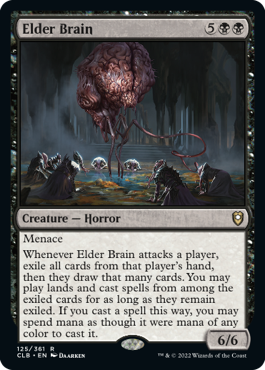
Elder Brain
{5}{B}{B}
Creature — Horror
6/6
Menace
Whenever Elder Brain attacks a player, exile all cards from that player's hand, then they draw that many cards. You may play lands and cast spells from among the exiled cards for as long as they remain exiled. If you cast a spell this way, you may spend mana as though it were mana of any color to cast it.
- The cards are exiled face up.
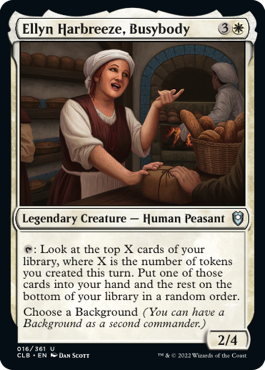
Ellyn Harbreeze, Busybody
{3}{W}
Legendary Creature — Human Peasant
2/4
{T}: Look at the top X cards of your library, where X is the number of tokens you created this turn. Put one of those cards into your hand and the rest on the bottom of your library in a random order.
Choose a Background (You can have a Background as a second commander.)
- Ellyn's ability counts all tokens you created that turn prior to the ability resolving, including both noncreature and creature tokens. It doesn't matter if those tokens are still on the battlefield or under your control.
- If an effect creates a copy of a permanent spell, that spell becomes a token on the battlefield under your control, but that token has not been "created." It won't count for Ellyn's ability.
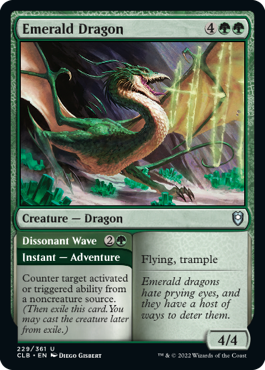
Emerald Dragon
{4}{G}{G}
Creature — Dragon
4/4
Flying, trample
//
Dissonant Wave
{2}{G}
Instant — Adventure
Counter target activated or triggered ability from a noncreature source. (Then exile this card. You may cast the creature later from exile.)
- Activated abilities are written in the form "Cost: Effect." Some keyword abilities, such as equip, are activated abilities and will have colons in their reminder texts.
- Triggered abilities use the word "when," "whenever," or "at." They're often written as "[Trigger condition], [effect]." Some keyword abilities, such as prowess and myriad, are triggered abilities and will have "when," "whenever," or "at" in their reminder texts.
- If you counter a delayed triggered ability that triggers at the beginning of the "next" occurrence of a specified step or phase, that ability won't trigger again the following time that phase or step occurs.
- Mana abilities can't be targeted. An activated mana ability is one that could produce mana as it resolves, doesn't require a target, and isn't a loyalty ability. A triggered mana ability is one that could produce mana as it resolves, triggers on the resolution of an activated mana ability or on mana being added, and doesn't require a target.
- Abilities that create replacement effects, such as a permanent entering the battlefield tapped or with counters on it, can't be targeted. Abilities that apply "as [this creature] enters the battlefield" are also replacement effects and can't be targeted.
- Activated and triggered abilities from noncreature sources include abilities of noncreature cards that can be activated or triggered from other zones, such as cycling abilities.
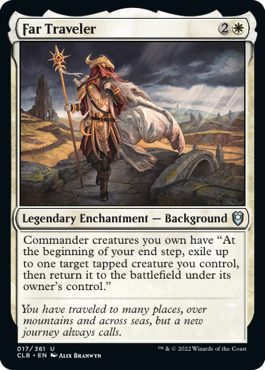
Far Traveler
{2}{W}
Legendary Enchantment — Background
Commander creatures you own have "At the beginning of your end step, exile up to one target tapped creature you control, then return it to the battlefield under its owner's control."
- When the card returns to the battlefield, it will be a new object with no connection to the card that was exiled. Auras attached to the exiled creature will be put into their owners' graveyards. Any Equipment will become unattached and remain on the battlefield. Any counters on the exiled permanent will cease to exist.
- If a token is exiled this way, it will cease to exist and won't return to the battlefield.
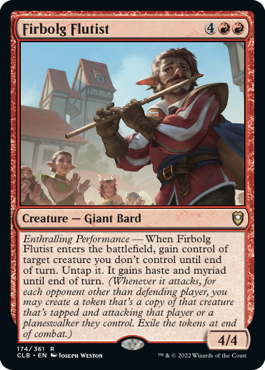
Firbolg Flutist
{4}{R}{R}
Creature — Giant Bard
4/4
Enthralling Performance — When Firbolg Flutist enters the battlefield, gain control of target creature you don't control until end of turn. Untap it. It gains haste and myriad until end of turn. (Whenever it attacks, for each opponent other than defending player, you may create a token that's a copy of that creature that's tapped and attacking that player or a planeswalker they control. Exile the tokens at end of combat.)
- Firbolg Flutist's triggered ability can target any creature you don't control, even one that is untapped.
- Gaining control of a creature doesn't cause you to gain control of any Auras or Equipment attached to it.
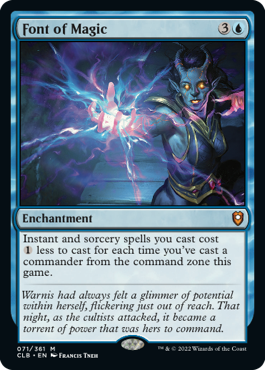
Font of Magic
{3}{U}
Enchantment
Instant and sorcery spells you cast cost {1} less to cast for each time you've cast a commander from the command zone this game.
- This includes Backgrounds that are your commander.
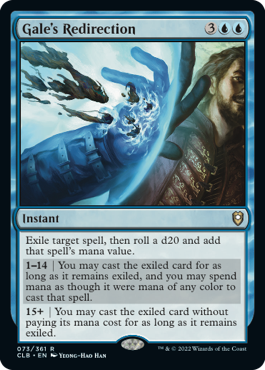
Gale's Redirection
{3}{U}{U}
Instant
Exile target spell, then roll a d20 and add that spell's mana value.
1–14 | You may cast the exiled card for as long as it remains exiled, and you may spend mana as though it were mana of any color to cast that spell.
15+ | You may cast the exiled card without paying its mana cost for as long as it remains exiled.
- If the exiled card is an adventurer card, you may cast the Adventure spell this way.
- If the spell had {X} in its mana cost, X will be whatever value it had on the stack when calculating its mana value.
- Gale's Redirection exiles the spell directly from the stack without countering it. Because of this, it's effective against spells that can't be countered.
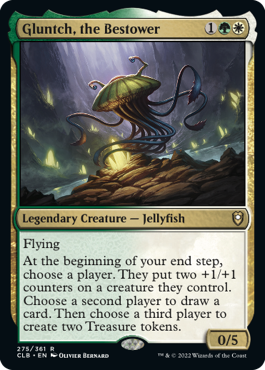
Gluntch, the Bestower
{1}{G}{W}
Legendary Creature — Jellyfish
0/5
Flying
At the beginning of your end step, choose a player. They put two +1/+1 counters on a creature they control. Choose a second player to draw a card. Then choose a third player to create two Treasure tokens.
- The first chosen player gets to choose which creature they will place the counters on.
- You may choose a player who doesn't control any creatures as the first chosen player.
- All three players must be different players, although any one of them can be you. If there are only two players in the game, you won't choose a third player, and no one will create Treasure tokens.
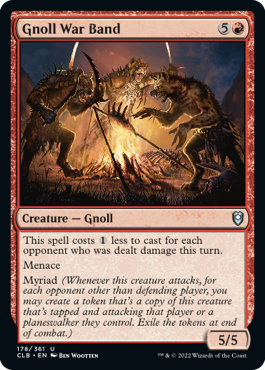
Gnoll War Band
{5}{R}
Creature — Gnoll
5/5
This spell costs {1} less to cast for each opponent who was dealt damage this turn.
Menace
Myriad (Whenever this creature attacks, for each opponent other than defending player, you may create a token that's a copy of this creature that's tapped and attacking that player or a planeswalker they control. Exile the tokens at end of combat.)
- Opponents who have left the game will not be counted when determining how many opponents have been dealt damage this turn.
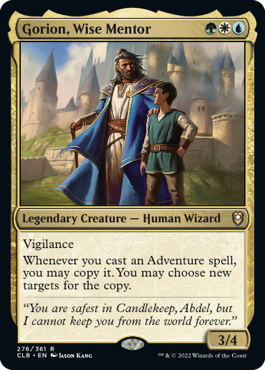
Gorion, Wise Mentor
{G}{W}{U}
Legendary Creature — Human Wizard
3/4
Vigilance
Whenever you cast an Adventure spell, you may copy it. You may choose new targets for the copy.
- An Adventure spell means an instant or sorcery with the Adventure spell type. Permanent spells that you cast which have an Adventure you aren't casting will not cause this ability to trigger.
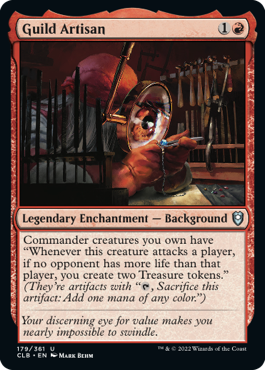
Guild Artisan
{1}{R}
Legendary Enchantment — Background
Commander creatures you own have "Whenever this creature attacks a player, if no opponent has more life than that player, you create two Treasure tokens." (They're artifacts with "{T}, Sacrifice this artifact: Add one mana of any color.")
- The ability granted by Guild Artisan is looking to see if any of the attacking player's opponents have a higher life total than that defending player. The attacking player's life total is not included in this comparison.
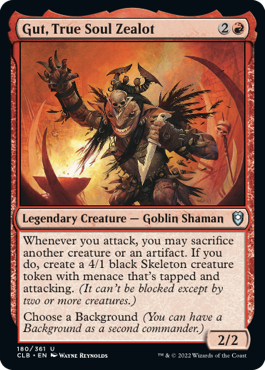
Gut, True Soul Zealot
{2}{R}
Legendary Creature — Goblin Shaman
2/2
Whenever you attack, you may sacrifice another creature or an artifact. If you do, create a 4/1 black Skeleton creature token with menace that's tapped and attacking. (It can't be blocked except by two or more creatures.)
Choose a Background (You can have a Background as a second commander.)
- You choose the player or planeswalker the Skeleton is attacking.
- Gut doesn't have to be among the attacking creatures.
- Although the Skeleton is an attacking creature, it was never declared as an attacking creature. This means that abilities that trigger whenever a creature attacks won't trigger when it enters the battlefield attacking.
- Any effects that say the Skeleton can't attack (such as that of Propaganda) affect only the declaration of attackers. They won't stop the Skeleton from entering the battlefield attacking.
- If Gut somehow becomes an artifact, you may sacrifice it to its own ability.
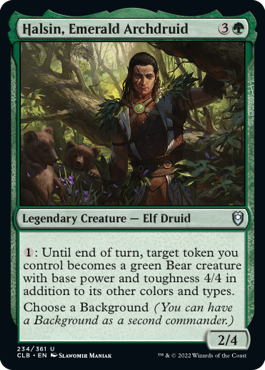
Halsin, Emerald Archdruid
{3}{G}
Legendary Creature — Elf Druid
2/4
{1}: Until end of turn, target token you control becomes a green Bear creature with base power and toughness 4/4 in addition to its other colors and types.
Choose a Background (You can have a Background as a second commander.)
- Halsin, Emerald Archdruid's activated ability overwrites any previous effects that set the creature's base power and toughness to specific values. Any power- or toughness-setting effects that start to apply after Halsin's ability resolves will overwrite this effect.
- Effects that modify a creature's power and/or toughness, such as the one created by Titanic Growth, will apply to the creature no matter when they started to take effect. The same is true for any counters that change its power and/or toughness and effects that switch power and toughness.
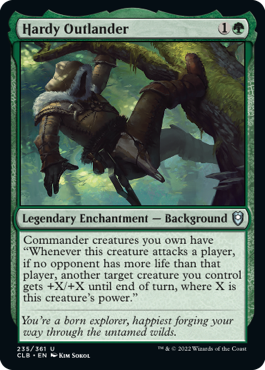
Hardy Outlander
{1}{G}
Legendary Enchantment — Background
Commander creatures you own have "Whenever this creature attacks a player, if no opponent has more life than that player, another target creature you control gets +X/+X until end of turn, where X is this creature's power."
- The ability granted by Hardy Outlander is looking to see if any of the attacking player's opponents have a higher life total than that defending player. The attacking player's life total is not included in this comparison.
- The value of X is determined only as the granted triggered ability resolves. Once that happens, the value of X won't change later in the turn even if the commander creature's power changes.
- If the commander creature leaves the battlefield before its triggered ability resolves, use its power as it last existed on the battlefield to determine the value of X.
- If the commander creature's power is negative as its triggered ability resolves, X is considered to be 0.
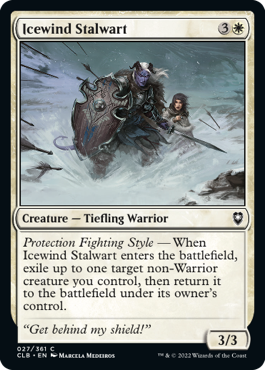
Icewind Stalwart
{3}{W}
Creature — Tiefling Warrior
3/3
Protection Fighting Style — When Icewind Stalwart enters the battlefield, exile up to one target non-Warrior creature you control, then return it to the battlefield under its owner's control.
- When the card returns to the battlefield, it will be a new object with no connection to the card that was exiled. Auras attached to the exiled creature will be put into their owners' graveyards. Any Equipment will become unattached and remain on the battlefield. Any counters on the exiled creature will cease to exist.
- If a token is exiled this way, it will cease to exist and won't return to the battlefield.
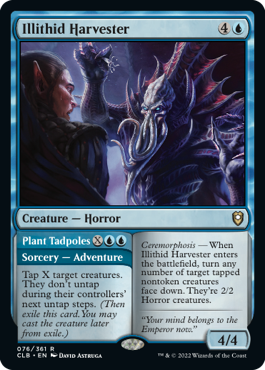
Illithid Harvester
{4}{U}
Creature — Horror
4/4
Ceremorphosis — When Illithid Harvester enters the battlefield, turn any number of target tapped nontoken creatures face down. They're 2/2 Horror creatures.
//
Plant Tadpoles
{X}{U}{U}
Sorcery — Adventure
Tap X target creatures. They don't untap during their controllers' next untap steps. (Then exile this card. You may cast the creature later from exile.)
- Once the permanents are face down, no player may mix them up on the battlefield or otherwise try to hide or disguise which card is which.
- Players may look at face-down permanents they control at any time.
- Illithid Harvester's triggered ability can't turn double-faced cards face down.
- If a face-down permanent leaves the battlefield, its owner must reveal it to all players.
- If a creature enters the battlefield as a copy of a face-down creature or if a token is created that's a copy of one, that copy has the same characteristics as the face-down creature (in this case, a 2/2 Horror creature with no other characteristics), even though the copy is face up.
- The Commander Legends: Battle for Baldur's Gate set includes no way to turn these cards face up. If an effect from cards outside of this set does turn one face up, the effect causing it to be a 2/2 Horror creature ends.
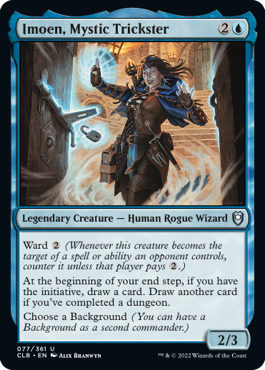
Imoen, Mystic Trickster
{2}{U}
Legendary Creature — Human Rogue Wizard
2/3
Ward {2} (Whenever this creature becomes the target of a spell or ability an opponent controls, counter it unless that player pays {2}.)
At the beginning of your end step, if you have the initiative, draw a card. Draw another card if you've completed a dungeon.
Choose a Background (You can have a Background as a second commander.)
- Imoen's second ability triggers only if you have the initiative as your end step begins. If the ability does trigger, it will check if you have the initiative again as it tries to resolve. If you don't still have the initiative at that time, the ability won't resolve and none of its effects will happen. Notably, if you don't have the initiative as your end step begins but you have completed a dungeon, the ability won't trigger and you won't draw any cards.
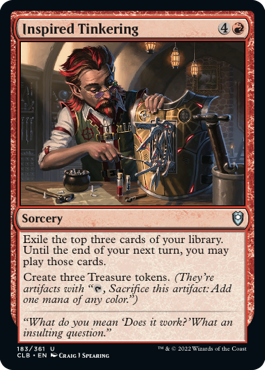
Inspired Tinkering
{4}{R}
Sorcery
Exile the top three cards of your library. Until the end of your next turn, you may play those cards.
Create three Treasure tokens. (They're artifacts with "{T}, Sacrifice this artifact: Add one mana of any color.")
- You must pay all costs and follow all timing rules for cards played this way. For example, you may play a land exiled this way only during your main phase and only if you haven't played a land yet this turn.
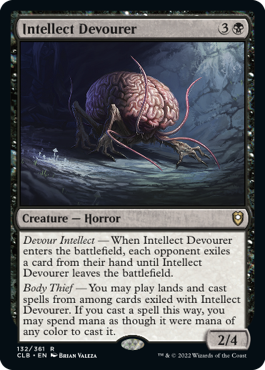
Intellect Devourer
{3}{B}
Creature — Horror
2/4
Devour Intellect — When Intellect Devourer enters the battlefield, each opponent exiles a card from their hand until Intellect Devourer leaves the battlefield.
Body Thief — You may play lands and cast spells from among cards exiled with Intellect Devourer. If you cast a spell this way, you may spend mana as though it were mana of any color to cast it.
- You must still follow all normal timing rules for cards played this way. For example, you may play a land exiled this way only during your main phase and only if you haven't played a land yet this turn.
- If Intellect Devourer leaves the battlefield before the Devour Intellect ability resolves, opponents won't exile any cards from their hands.
- If a card exiled with the Devour Intellect leaves exile for any reason (most likely because it was played using the Body Thief ability), it won't be returned to the opponent's hand if Intellect Devourer leaves the battlefield.
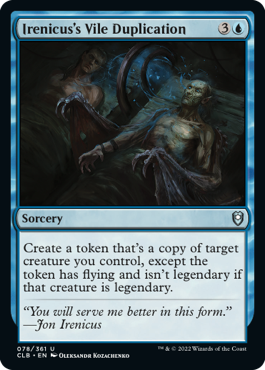
Irenicus's Vile Duplication
{3}{U}
Sorcery
Create a token that's a copy of target creature you control, except the token has flying and it isn't legendary if that creature is legendary.
- Irenicus's Vile Duplication has received an update to its Oracle text to clarify that the token still has flying even if the creature it's copying isn't legendary.
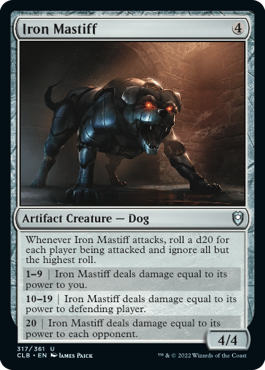
Iron Mastiff
{4}
Artifact Creature — Dog
4/4
Whenever Iron Mastiff attacks, roll a d20 for each player being attacked and ignore all but the highest roll.
1–9 | Iron Mastiff deals damage equal to its power to you.
10–19 | Iron Mastiff deals damage equal to its power to defending player.
20 | Iron Mastiff deals damage equal to its power to each opponent.
- Once Iron Mastiff's triggered ability begins to resolve, no player may cast spells or activate abilities until it finishes resolving. Notably, this means that players may not take actions that would change Iron Mastiff's power after they know the result of the rolls but before players are dealt damage.
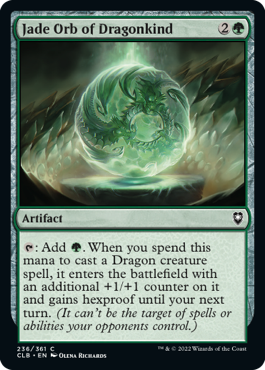
Jade Orb of Dragonkind
{2}{G}
Artifact
{T}: Add {G}. When you spend this mana to cast a Dragon creature spell, it enters the battlefield with an additional +1/+1 counter on it and gains hexproof until your next turn. (It can't be the target of spells or abilities your opponents control.)
- The mana created by Jade Orb of Dragonkind can be spent on anything, not just Dragon creature spells.
- The delayed triggered ability will trigger whether Jade Orb of Dragonkind is still on the battlefield or not.
- If more than one {G} produced by a Jade Orb of Dragonkind is spent to cast a single Dragon creature spell, the delayed triggered ability associated with each mana spent will trigger. That creature will enter the battlefield with that many +1/+1 counters.
- If the mana is spent on a Dragon creature spell, that creature will have hexproof as soon as it enters the battlefield. There is no opportunity to target the creature before it gains hexproof.
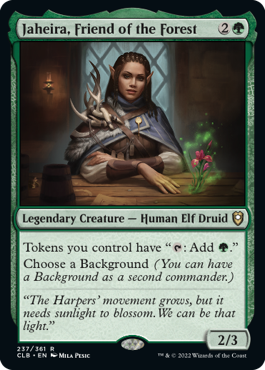
Jaheira, Friend of the Forest
{2}{G}
Legendary Creature — Human Elf Druid
2/3
Tokens you control have "{T}: Add {G}."
Choose a Background (You can have a Background as a second commander.)
- Jaheira's ability gives the mana ability to all tokens you control, not just creature tokens.
- You won't be able to activate the mana abilities of creature tokens you control on the turn they're created unless they have haste. Conversely, you will be able to activate the mana abilities of noncreature tokens you control on the turn they're created (provided they're untapped).
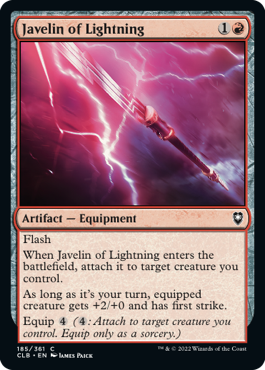
Javelin of Lightning
{1}{R}
Artifact — Equipment
Flash
When Javelin of Lightning enters the battlefield, attach it to target creature you control.
As long as it's your turn, equipped creature gets +2/+0 and has first strike.
Equip {4} ({4}: Attach to target creature you control. Equip only as a sorcery.)
- Attaching an Equipment with its enters-the-battlefield triggered ability isn't the same as using its equip ability. You don't pay mana for the attachment, and the timing restrictions for equip abilities don't apply.
- If the target creature becomes an illegal target, the Equipment remains on the battlefield unattached.
- Javelin of Lightning doesn't enter the battlefield attached to a creature. Instead, the Equipment enters the battlefield and then a triggered ability attaches it to a creature. You may cast Javelin of Lightning even if you don't control any creatures.
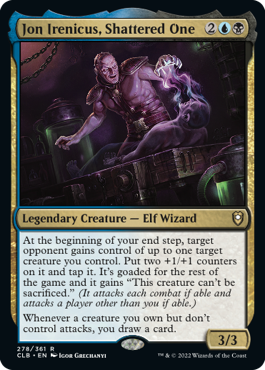
Jon Irenicus, Shattered One
{2}{U}{B}
Legendary Creature — Elf Wizard
3/3
At the beginning of your end step, target opponent gains control of up to one target creature you control. Put two +1/+1 counters on it and tap it. It's goaded for the rest of the game and it gains "This creature can't be sacrificed." (It attacks each combat if able and attacks a player other than you if able.)
Whenever a creature you own but don't control attacks, you draw a card.
- A token's owner is the player who created it.
- When Jon Irenicus's first ability resolves, the opponent will gain control of a creature and that creature will immediately gain "This creature can't be sacrificed" as part of the resolution of the ability. There is no window of opportunity for that player to sacrifice that creature before it gains the ability.
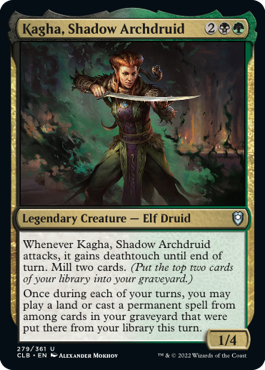
Kagha, Shadow Archdruid
{2}{B}{G}
Legendary Creature — Elf Druid
1/4
Whenever Kagha, Shadow Archdruid attacks, it gains deathtouch until end of turn. Mill two cards. (Put the top two cards of your library into your graveyard.)
Once during each of your turns, you may play a land or cast a permanent spell from among cards in your graveyard that were put there from your library this turn.
- You must follow the normal timing rules of the card you play from your graveyard.
- You must pay all costs when casting a spell this way.
- Once you begin to cast the spell, losing control of Kagha won't affect it. You can finish casting it as normal.
- If you play a land or cast a permanent spell from your graveyard using another permission, it won't count as the "once during each of your turns" for Kagha's effect.
- If you play a land or cast a permanent spell from your graveyard via Kagha, and then have a new Kagha come under your control in the same turn, you may do so again that turn.
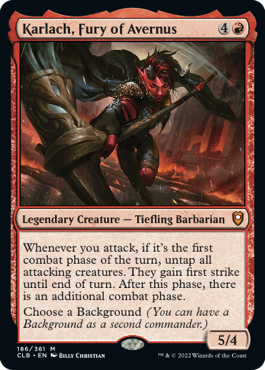
Karlach, Fury of Avernus
{4}{R}
Legendary Creature — Tiefling Barbarian
5/4
Whenever you attack, if it's the first combat phase of the turn, untap all attacking creatures. They gain first strike until end of turn. After this phase, there is an additional combat phase.
Choose a Background (You can have a Background as a second commander.)
- Notably, the triggered ability of Karlach doesn't give you any additional main phases. This means that you will move directly from the end of combat step of one combat phase to the beginning of combat step of the next one.
- Karlach doesn't have to be among the attacking creatures.
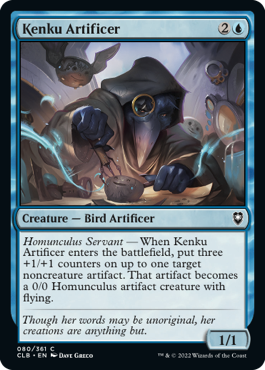
Kenku Artificer
{2}{U}
Creature — Bird Artificer
1/1
Homunculus Servant — When Kenku Artificer enters the battlefield, put three +1/+1 counters on up to one target noncreature artifact. That artifact becomes a 0/0 Homunculus artifact creature with flying.
- Kenku Artificer doesn't remove any abilities the target artifact has.
- The artifact retains any types, subtypes, or supertypes it has.
- If the target artifact is an attached Equipment, it becomes unattached. If an Equipment without reconfigure becomes an artifact creature, it can't be attached to another creature.
- If the target noncreature artifact is a Vehicle, its power and toughness will be set to 0/0. Crewing that Vehicle will not restore its power and toughness.
- The resulting artifact creature will be able to attack on your turn if it's been under your control continuously since the turn began. That is, it doesn't matter how long it's been a creature, just how long it's been on the battlefield.
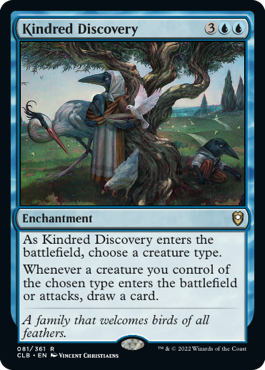
Kindred Discovery
{3}{U}{U}
Enchantment
As Kindred Discovery enters the battlefield, choose a creature type.
Whenever a creature you control of the chosen type enters the battlefield or attacks, draw a card.
- The choice of creature type is made as Kindred Discovery enters the battlefield. Players can't take any actions between the time the choice is made and the time it enters the battlefield. Notably, this means that if it is entering the battlefield at the same time as any creatures of the chosen type, its last ability will trigger.
- You must choose an existing creature type, such as Human or Warrior. Card types such as artifact and supertypes such as legendary can't be chosen.
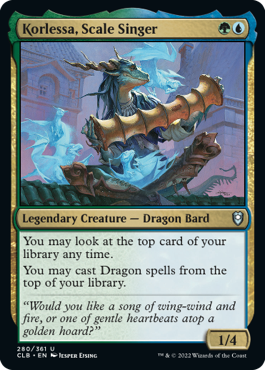
Korlessa, Scale Singer
{G}{U}
Legendary Creature — Dragon Bard
1/4
You may look at the top card of your library any time.
You may cast Dragon spells from the top of your library.
- You can look at the top card of your library whenever you want (with one restriction; see below), even if you don't have priority. This action doesn't use the stack. Knowing what that card is becomes part of the information you have access to, just like you can look at the cards in your hand.
- If the top card of your library changes while you're casting a spell, playing a land, or activating an ability, you can't look at the new top card until you finish doing so. This means that if you cast a spell from the top of your library, you can't look at the next one until you're done paying for that spell.
- Korlessa doesn't change when you can cast Dragon spells. Normally, this means during your main phase when the stack is empty, although flash may change this.
- You'll still pay all costs for the spell, including additional costs. You may also pay alternative costs if any are available.
- The top card of your library isn't in your hand, so you can't take other actions that would normally be allowed from your hand, such as discarding it due to an effect or activating a cycling ability.
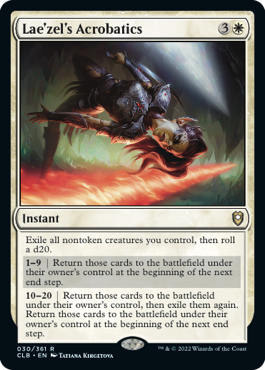
Lae'zel's Acrobatics
{3}{W}
Instant
Exile all nontoken creatures you control, then roll a d20.
1–9 | Return those cards to the battlefield under their owner's control at the beginning of the next end step.
10–20 | Return those cards to the battlefield under their owner's control, then exile them again. Return those cards to the battlefield under their owner's control at the beginning of the next end step.
- Auras attached to the exiled creatures will be put into their owners' graveyards. Any Equipment will become unattached and remain on the battlefield. Any counters on the exiled creatures will cease to exist. When the cards return to the battlefield, they will be new objects with no connection to the cards that were exiled.
- The creatures you control are exiled before you roll a die. Notably, this means that if any of those creatures have abilities that replace a die roll or trigger due to a die roll, those won't occur.
- Any abilities that trigger during the resolution of Lae'zel's Acrobatics will wait to go on the stack until after it's finished resolving. That means that if you roll 10–20, any abilities that trigger when the creatures are exiled the first time, return to the battlefield, or are exiled the second time can be put on the stack in any order. The active player puts their abilities on the stack first in an order of their choice, followed by every other player in turn order. The last ability to be put on the stack will be the first to resolve.
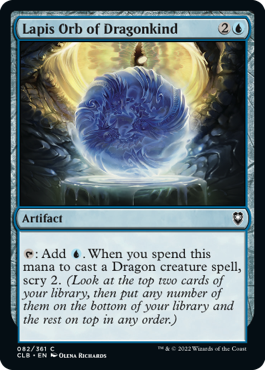
Lapis Orb of Dragonkind
{2}{U}
Artifact
{T}: Add {U}. When you spend this mana to cast a Dragon creature spell, scry 2. (Look at the top two cards of your library, then put any number of them on the bottom of your library and the rest on top in any order.)
- The mana created by Lapis Orb of Dragonkind can be spent on anything, not just Dragon creature spells.
- The delayed triggered ability will trigger whether Lapis Orb of Dragonkind is still on the battlefield or not.
- If more than one {U} produced by a Lapis Orb of Dragonkind is spent to cast a single Dragon creature spell, the delayed triggered ability associated with each mana spent will trigger. You will scry 2 that many times.
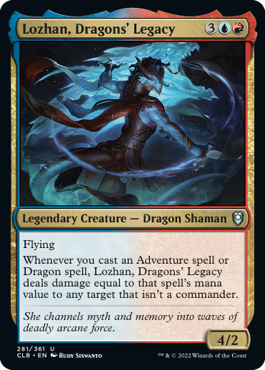
Lozhan, Dragons' Legacy
{3}{U}{R}
Legendary Creature — Dragon Shaman
4/2
Flying
Whenever you cast an Adventure or Dragon spell, Lozhan, Dragons' Legacy deals damage equal to that spell's mana value to any target that isn't a commander.
- If you cast a non-Dragon permanent spell that has an Adventure (rather than the Adventure itself) Lozhan's triggered ability will not trigger.
- The mana value of an Adventure spell is the based on the mana cost of the Adventure, not the mana cost of the permanent card that has the Adventure.
- "Any target that isn't a commander" includes any player, as well as any creature or planeswalker that isn't a commander.
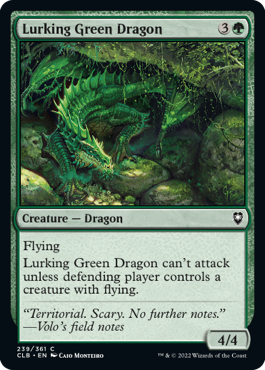
Lurking Green Dragon
{3}{G}
Creature — Dragon
4/4
Flying
Lurking Green Dragon can't attack unless defending player controls a creature with flying.
- Lurking Green Dragon's second ability applies only while you're declaring attackers. It is not removed from combat if the creature with flying leaves the battlefield, changes controllers, or loses flying after Lurking Green Dragon is declared as an attacker.
- If a creature attacks a planeswalker, that planeswalker's controller is the defending player.
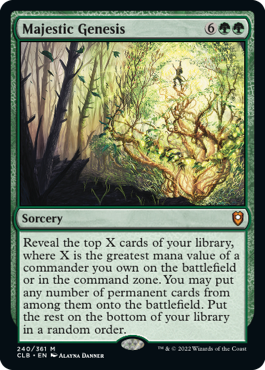
Majestic Genesis
{6}{G}{G}
Sorcery
Reveal the top X cards of your library, where X is the greatest mana value of a commander you own on the battlefield or in the command zone. You may put any number of permanent cards from among them onto the battlefield. Put the rest on the bottom of your library in a random order.
- If your commander is under the control of another player as Majestic Genesis resolves, it is still on the battlefield and will still be used to determine the value of X.
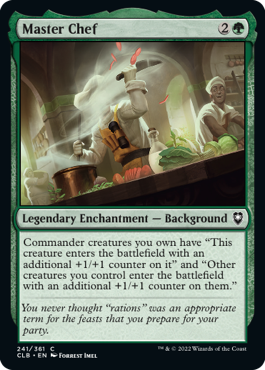
Master Chef
{2}{G}
Legendary Enchantment — Background
Commander creatures you own have "This creature enters the battlefield with an additional +1/+1 counter on it" and "Other creatures you control enter the battlefield with an additional +1/+1 counter on them."
- If your commander is entering the battlefield at the same time as other creatures, it will enter the battlefield with an additional +1/+1 counter, but the other creatures will not. This is because a replacement effect that is created by an object entering the battlefield can only apply to itself.
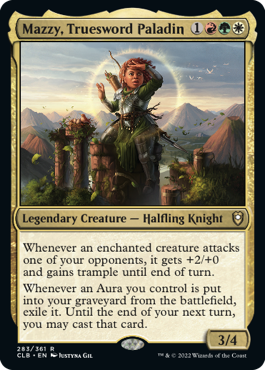
Mazzy, Truesword Paladin
{1}{R}{G}{W}
Legendary Creature — Halfling Knight
3/4
Whenever an enchanted creature attacks one of your opponents, it gets +2/+0 and gains trample until end of turn.
Whenever an Aura you control is put into your graveyard from the battlefield, exile it. Until the end of your next turn, you may cast that card.
- You must still pay all costs and follow all timing rules when casting the card from exile.
- In some unusual cases, the Aura put into your graveyard isn't an Aura card. This may happen due to copy effects, for example. In these cases, you'll still exile the card and you may cast it.
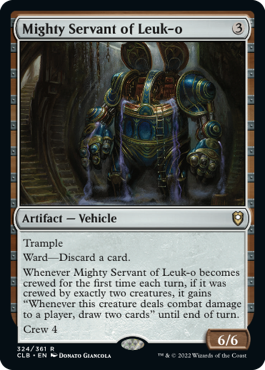
Mighty Servant of Leuk-o
{3}
Artifact — Vehicle
6/6
Trample
Ward—Discard a card.
Whenever Mighty Servant of Leuk-o becomes crewed for the first time each turn, if it was crewed by exactly two creatures, it gains "Whenever this creature deals combat damage to a player, draw two cards" until end of turn.
Crew 4
- An ability that triggers whenever a Vehicle "becomes crewed" triggers when its crew ability resolves. In this case, it will trigger only if exactly two creatures were tapped to pay the crew cost of the ability that caused it to become crewed for the first time that turn.
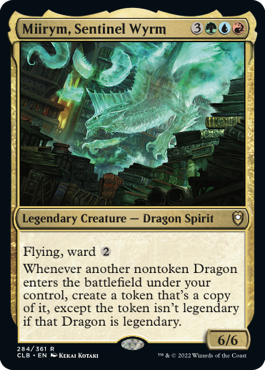
Miirym, Sentinel Wyrm
{3}{G}{U}{R}
Legendary Creature — Dragon Spirit
6/6
Flying, ward {2}
Whenever another nontoken Dragon enters the battlefield under your control, create a token that's a copy of it, except the token isn't legendary if that Dragon is legendary.
- Miirym, Sentinel Wyrm's triggered ability copies the printed values of the Dragon that entered the battlefield. It won't copy any counters on that creature or any effects that have changed its power, toughness, types, color, and so on.
- If the Dragon that entered the battlefield is copying something else as the triggered ability resolves, the token will be a copy of whatever that creature is a copy of.
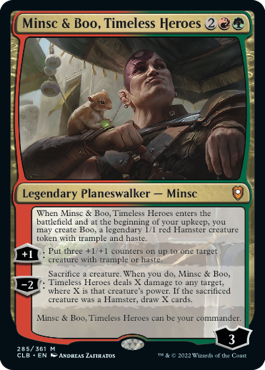
Minsc & Boo, Timeless Heroes
{2}{R}{G}
Legendary Planeswalker — Minsc
3
When Minsc & Boo, Timeless Heroes enters the battlefield and at the beginning of your upkeep, you may create Boo, a legendary 1/1 red Hamster creature token with trample and haste.
+1: Put three +1/+1 counters on up to one target creature with trample or haste.
−2: Sacrifice a creature. When you do, Minsc & Boo, Timeless Heroes deals X damage to any target, where X is that creature's power. If the sacrificed creature was a Hamster, draw X cards.
Minsc & Boo, Timeless Heroes can be your commander.
- If there is no legal target for the reflexive trigger in Minsc & Boo's second loyalty ability, or if the target is illegal as the ability tries to resolve, you will not draw any cards even if the sacrificed creature was a Hamster.
- Minsc & Boo's second loyalty ability won't deal extra damage if you shout "Go for the eyes, Boo!" but it definitely can't hurt.
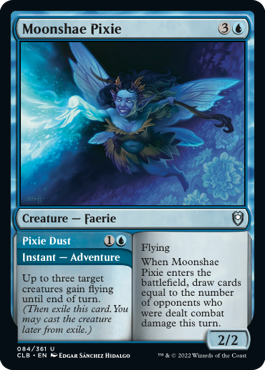
Moonshae Pixie
{3}{U}
Creature — Faerie
2/2
Flying
When Moonshae Pixie enters the battlefield, draw cards equal to the number of opponents who were dealt combat damage this turn.
//
Pixie Dust
{1}{U}
Instant — Adventure
Up to three target creatures gain flying until end of turn. (Then exile this card. You may cast the creature later from exile.)
- Moonshae Pixie's triggered ability counts only players who are still in the game. If an opponent was dealt damage but then left the game, that player isn't counted.
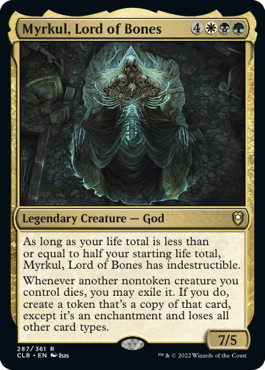
Myrkul, Lord of Bones
{4}{W}{B}{G}
Legendary Creature — God
7/5
As long as your life total is less than or equal to half your starting life total, Myrkul, Lord of Bones has indestructible.
Whenever another nontoken creature you control dies, you may exile it. If you do, create a token that's a copy of that card, except it's an enchantment and loses all other card types.
- If Myrkul, Lord of Bones is dealt lethal damage at the same time that its controller's life total is reduced to less than or equal to half their starting life total, Myrkul will have indestructible at the time state-based actions are performed and survive.
- The last ability creates a copy of the card as it last existed in the graveyard, not of the creature as it last existed on the battlefield.
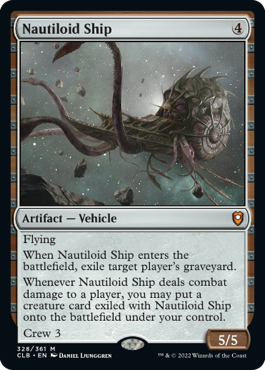
Nautiloid Ship
{4}
Artifact — Vehicle
5/5
Flying
When Nautiloid Ship enters the battlefield, exile target player's graveyard.
Whenever Nautiloid Ship deals combat damage to a player, you may put a creature card exiled with Nautiloid Ship onto the battlefield under your control.
Crew 3
- If Nautiloid Ship leaves the battlefield and later returns to the battlefield, it is a new object with no memory of its previous existence. Specifically, you can't use its third ability to put cards onto the battlefield that were exiled with it the last time it was on the battlefield.
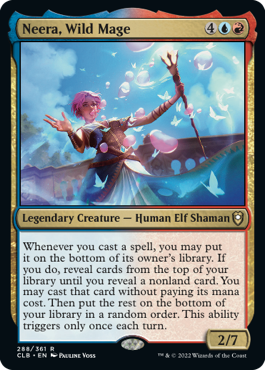
Neera, Wild Mage
{4}{U}{R}
Legendary Creature — Human Elf Shaman
2/7
Whenever you cast a spell, you may put it on the bottom of its owner's library. If you do, reveal cards from the top of your library until you reveal a nonland card. You may cast that card without paying its mana cost. Then put all revealed cards not cast this way on the bottom of your library in a random order. This ability triggers only once each turn.
- You must have legal targets to cast a spell with targets, even if you intend to put it onto the bottom of your library this way.
- Neera, Wild Mage has received a minor update to its Oracle text to clarify its function. Specifically, if you choose not to cast the nonland card, it will be put on the bottom of your library along with the other revealed cards.
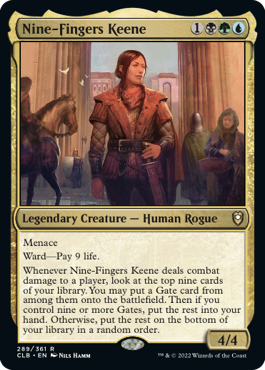
Nine-Fingers Keene
{1}{B}{G}{U}
Legendary Creature — Human Rogue
4/4
Menace
Ward—Pay 9 life.
Whenever Nine-Fingers Keene deals combat damage to a player, look at the top nine cards of your library. You may put a Gate card from among them onto the battlefield. Then if you control nine or more Gates, put the rest into your hand. Otherwise, put the rest on the bottom of your library in a random order.
- If you do not put a Gate card onto the battlefield this way but already control nine or more Gates, you will put all the cards into your hand.
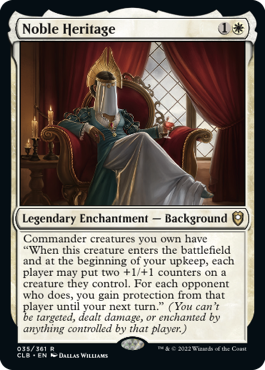
Noble Heritage
{1}{W}
Legendary Enchantment — Background
Commander creatures you own have "When this creature enters the battlefield and at the beginning of your upkeep, each player may put two +1/+1 counters on a creature they control. For each opponent who does, you gain protection from that player until your next turn." (You can't be targeted, dealt damage, or enchanted by anything controlled by that player.)
- Protection from a player means that you have protection from each object controlled by that player. If an object has no controller (such as a card in a graveyard), its owner is considered its controller for this purpose.
- Although you'll have protection from players who take advantage of your generous offer, permanents you control will not.
- Creatures can still attack you even if you have protection from their controller, although any damage they would deal to you will be prevented.
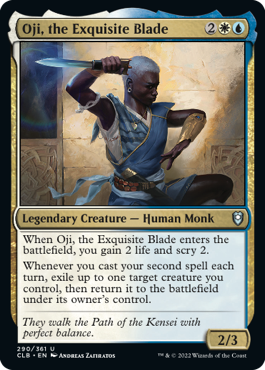
Oji, the Exquisite Blade
{2}{W}{U}
Legendary Creature — Human Monk
2/3
When Oji, the Exquisite Blade enters the battlefield, you gain 2 life and scry 2.
Whenever you cast your second spell each turn, exile up to one target creature you control, then return it to the battlefield under its owner's control.
- When the card returns to the battlefield, it will be a new object with no connection to the card that was exiled. Auras attached to the exiled creature will be put into their owners' graveyards. Any Equipment will become unattached and remain on the battlefield. Any counters on the exiled creature will cease to exist.
- If a token is exiled this way, it will cease to exist and won't return to the battlefield.
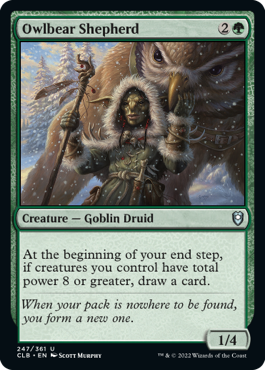
Owlbear Shepherd
{2}{G}
Creature — Goblin Druid
1/4
At the beginning of your end step, if creatures you control have total power 8 or greater, draw a card.
- Owlbear Shepherd's ability has an intervening if clause, which means that it checks to see if creatures you control have total power 8 or greater both as it would trigger and as it resolves. If enough creatures have been removed or their total power is reduced to below 8 by the time the ability tries to resolve, you will not draw a card.
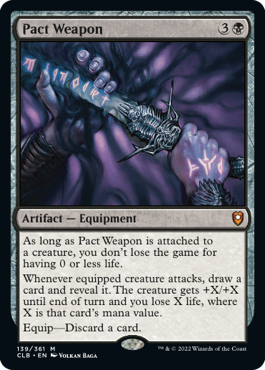
Pact Weapon
{3}{B}
Artifact — Equipment
As long as Pact Weapon is attached to a creature, you don't lose the game for having 0 or less life.
Whenever equipped creature attacks, draw a card and reveal it. The creature gets +X/+X until end of turn and you lose X life, where X is that card's mana value.
Equip—Discard a card.
- If an opponent gains control of the creature that Pact Weapon is attached to but doesn't also gain control of Pact Weapon, you still control Pact Weapon and still don't lose the game for having 0 or less life as long as it is attached.
- Similarly, if an opponent gains control of the equipped creature without gaining control of Pact Weapon and attacks with it, you will draw a card, reveal it, and lose life.
- If the card draw is replaced with another effect, the equipped creature won't get any bonus to its power and toughness and you won't lose any life. This is true even if the card draw is replaced by one or more card draws.
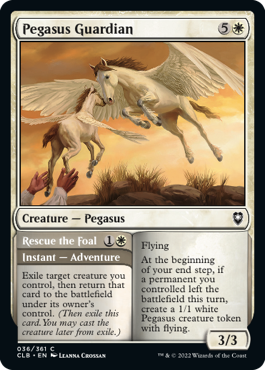
Pegasus Guardian
{5}{W}
Creature — Pegasus
3/3
Flying
At the beginning of your end step, if a permanent you controlled left the battlefield this turn, create a 1/1 white Pegasus creature token with flying.
//
Rescue the Foal
{1}{W}
Instant — Adventure
Exile target creature you control, then return that card to the battlefield under its owner's control. (Then exile this card. You may cast the creature later from exile.)
- Pegasus Guardian's triggered ability will trigger even if Pegasus Guardian wasn't under your control at the time the permanent you controlled left the battlefield.
- When the card exiled by Rescue the Foal returns to the battlefield, it will be a new object with no connection to the card that was exiled. Auras attached to the exiled creature will be put into their owners' graveyards. Any Equipment will become unattached and remain on the battlefield. Any counters on the exiled creature will cease to exist.
- If a token is exiled this way, it will cease to exist and won't return to the battlefield.
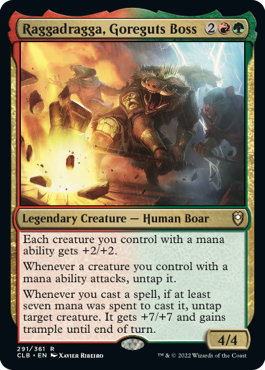
Raggadragga, Goreguts Boss
{2}{R}{G}
Legendary Creature — Human Boar
4/4
Each creature you control with a mana ability gets +2/+2.
Whenever a creature you control with a mana ability attacks, untap it.
Whenever you cast a spell, if at least seven mana was spent to cast it, untap target creature. It gets +7/+7 and gains trample until end of turn.
- Most mana abilities found on creatures are activated mana abilities. An activated mana ability is an activated ability that could produce mana as it resolves, does not require a target, and isn't a loyalty ability.
- Some creatures may have triggered mana abilities. A triggered mana ability is a triggered ability that could produce mana as it resolves, triggers on the resolution of an activated mana ability or on mana being added, and doesn't require a target.
- Raggadragga's last ability can target any creature, including one that's untapped.

Rasaad yn Bashir
{2}{W}
Legendary Creature — Human Monk
0/3
Each creature you control assigns combat damage equal to its toughness rather than its power.
Whenever Rasaad yn Bashir attacks, if you have the initiative, double the toughness of each creature you control until end of turn.
Choose a Background (You can have a Background as a second commander.)
- Rasaad yn Bashir's first ability doesn't actually change any creature's power. It changes only the amount of combat damage it assigns. All other rules and effects that check power or toughness use the real values.
- To double a creature's toughness, that creature gets +0/+X, where X is that creature's toughness as the triggered ability resolves.

Renari, Merchant of Marvels
{3}{U}
Legendary Creature — Dragon Artificer
2/4
You may cast Dragon spells and artifact spells as though they had flash.
Choose a Background (You can have a Background as a second commander.)
- The first ability applies to Dragon spells and artifact spells that are cast from any zone, provided something is allowing you do cast them. For example, if another effect allows you to cast Dragon spells from your graveyard, Renari will allow you to do so as though they had flash.
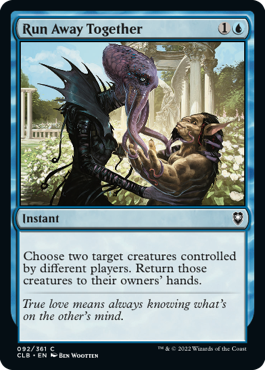
Run Away Together
{1}{U}
Instant
Choose two target creatures controlled by different players. Return those creatures to their owners' hands.
- If one of the two target creatures becomes an illegal target, Run Away Together can still determine its controller only to check whether the other creature is a legal target. If the illegal target has left the battlefield, use its last known information. If the other creature is still a legal target, it's returned to its owner's hand.
- If both creatures are controlled by the same player as Run Away Together tries to resolve, both targets are illegal. The spell doesn't resolve.
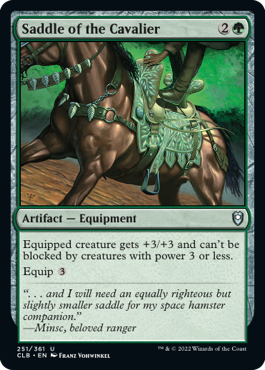
Saddle of the Cavalier
{2}{G}
Artifact — Equipment
Equipped creature gets +3/+3 and can't be blocked by creatures with power 3 or less.
Equip {3}
- Reducing a creature's power after it has blocked a creature equipped with Saddle of the Cavalier will not remove that blocking creature from combat or make the equipped creature unblocked.
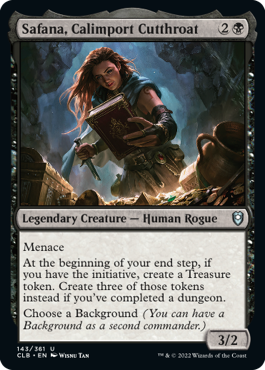
Safana, Calimport Cutthroat
{2}{B}
Legendary Creature — Human Rogue
3/2
Menace
At the beginning of your end step, if you have the initiative, create a Treasure token. Create three of those tokens instead if you've completed a dungeon.
Choose a Background (You can have a Background as a second commander.)
- Safana's second ability triggers only if you have the initiative as your end step begins. If the ability does trigger, it will check if you have the initiative again as it tries to resolve. If you don't still have the initiative at that time, the ability won't resolve and none of its effects will happen. Notably, if you don't have the initiative as your end step begins but you have completed a dungeon, the ability won't trigger and you won't create any Treasures.
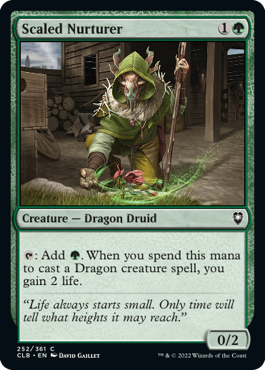
Scaled Nurturer
{1}{G}
Creature — Dragon Druid
0/2
{T}: Add {G}. When you spend this mana to cast a Dragon creature spell, you gain 2 life.
- The mana created by Scaled Nurturer can be spent on anything, not just Dragon creature spells.
- The delayed triggered ability will trigger whether Scaled Nurturer is still on the battlefield or not.
- If more than one {G} produced by a Scaled Nurturer is spent to cast a single Dragon creature spell, the delayed triggered ability associated with each mana spent will trigger. You will gain 2 life that many times.
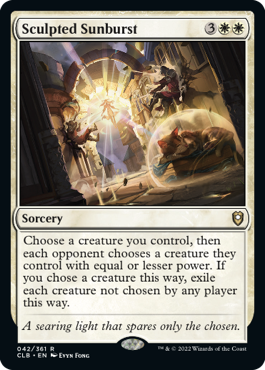
Sculpted Sunburst
{3}{W}{W}
Sorcery
Choose a creature you control, then each opponent chooses a creature they control with equal or lesser power. If you chose a creature this way, exile each creature not chosen by any player this way.
- If you do not choose a creature, most likely because you don't control any, no creatures will be exiled.
- Sculpted Sunburst doesn't target any of the chosen creatures. All of the choices are made as Sculpted Sunburst resolves.
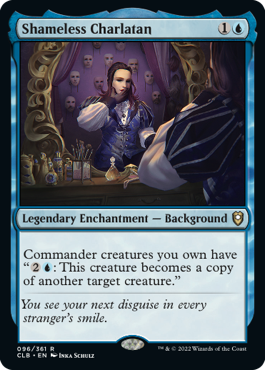
Shameless Charlatan
{1}{U}
Legendary Enchantment — Background
Commander creatures you own have "{2}{U}: This creature becomes a copy of another target creature."
- The copy effect doesn't have a duration. It lasts until the commander leaves the battlefield, though another copy effect with a later timestamp (perhaps from a new activation of the ability granted by Shameless Charlatan) would override the effect for as long as it's active.
- If your commander becomes a copy of something else while you control Shameless Charlatan, it will still be your commander and it will still have the ability granted to it.
- If Shameless Charlatan is your commander and somehow becomes a creature, and you use the ability it grants itself to make it a copy of another creature, it will no longer have its ability so it would no longer grant the activated ability to commander creatures you own (including itself).
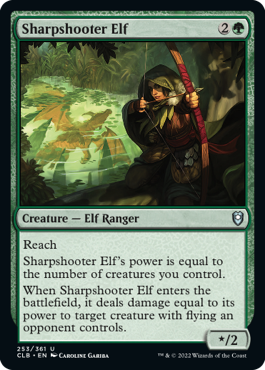
Sharpshooter Elf
{2}{G}
Creature — Elf Ranger
*/2
Reach
Sharpshooter Elf's power is equal to the number of creatures you control.
When Sharpshooter Elf enters the battlefield, it deals damage equal to its power to target creature with flying an opponent controls.
- If Sharpshooter Elf leaves the battlefield while its triggered ability is on the stack, use its power as it last existed on the battlefield to determine how much damage it deals.
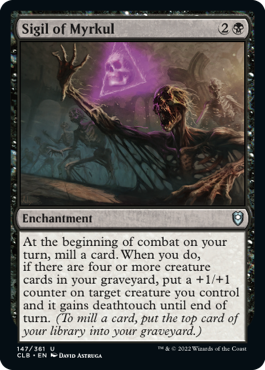
Sigil of Myrkul
{2}{B}
Enchantment
At the beginning of combat on your turn, mill a card. When you do, if there are four or more creature cards in your graveyard, put a +1/+1 counter on target creature you control and it gains deathtouch until end of turn. (To mill a card, put the top card of your library into your graveyard.)
- Sigil of Myrkul's triggered ability triggers and goes on the stack without a target. After you mill a card, if there are four or more creature cards in your graveyard, the reflexive triggered ability will trigger. You choose the target for that ability at that time.
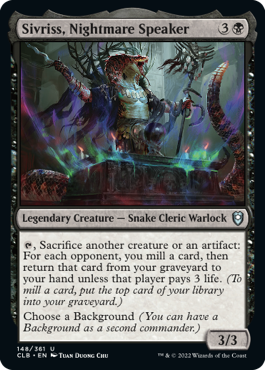
Sivriss, Nightmare Speaker
{3}{B}
Legendary Creature — Snake Cleric Warlock
3/3
{T}, Sacrifice another creature or an artifact: For each opponent, you mill a card, then return that card from your graveyard to your hand unless that player pays 3 life. (To mill a card, put the top card of your library into your graveyard.)
Choose a Background (You can have a Background as a second commander.)
- To resolve the activated ability, first mill a card for the first opponent in turn order. That player chooses whether to pay 3 life or not. The card is returned to your hand unless they paid the life. Then mill a card for the next opponent, and so on.
- If Sivriss somehow becomes an artifact, you may sacrifice it to its own ability.
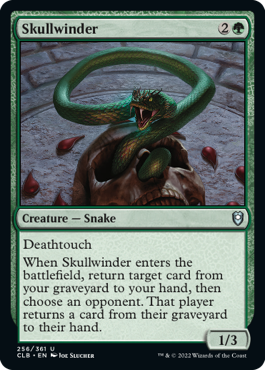
Skullwinder
{2}{G}
Creature — Snake
1/3
Deathtouch
When Skullwinder enters the battlefield, return target card from your graveyard to your hand, then choose an opponent. That player returns a card from their graveyard to their hand.
- Skullwinder's enters-the-battlefield ability targets only the card in your graveyard. If that card is an illegal target as the ability tries to resolve, the ability won't resolve and none of its effects will happen. No cards will be returned to any player's hand.
- You choose the target card as you put Skullwinder's triggered ability on the stack, but you don't choose an opponent until after you have returned the card to your hand.
- The chosen opponent gets to choose which card to return from their graveyard to their hand.
- You may choose an opponent with no cards in their graveyard. In that case, they will not get to return anything.
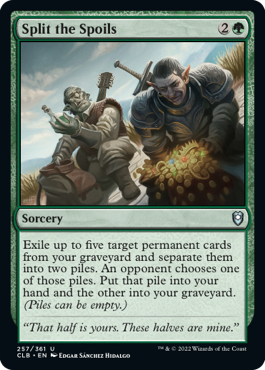
Split the Spoils
{2}{G}
Sorcery
Exile up to five target permanent cards from your graveyard and separate them into two piles. An opponent chooses one of those piles. Put that pile into your hand and the other into your graveyard. (Piles can be empty.)
- You decide which opponent chooses the pile while resolving Split the Spoils.
- A pile may have zero cards in it but, if your opponent chooses that pile, you put all the cards back into your graveyard.
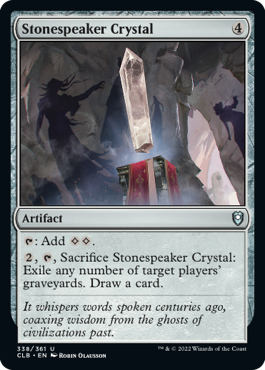
Stonespeaker Crystal
{4}
Artifact
{T}: Add {C}{C}.
{2}, {T}, Sacrifice Stonespeaker Crystal: Exile any number of target players' graveyards. Draw a card.
- You choose any number of target players as you put Stonespeaker Crystal's ability on the stack and exile their graveyards as it resolves. You may not target a player and then choose not to exile their graveyard.
- You may choose to target no players while activating the last ability if you just want to draw a card.
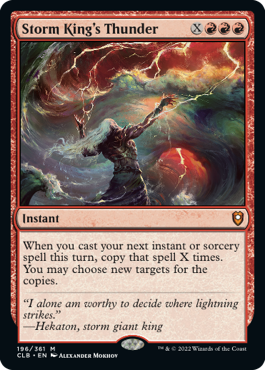
Storm King's Thunder
{X}{R}{R}{R}
Instant
When you cast your next instant or sorcery spell this turn, copy that spell X times. You may choose new targets for the copies.
- When the delayed triggered ability of Storm King's Thunder resolves, it creates X copies of a spell. You control each of the copies. Those copies are created on the stack, so they're not "cast." Abilities that trigger when a player casts a spell won't trigger. The copies will then resolve like normal spells, after players get a chance to cast spells and activate abilities.
- Storm King's Thunder will create copies of the spell that caused its delayed triggered ability to trigger even if that spell has been countered by the time that ability resolves.
- Each of the copies will have the same targets as the spell it's copying unless you choose new ones. You may change any number of the targets, including all of them or none of them. If, for one of the targets, you can't choose a new legal target, then it remains unchanged (even if the current target is illegal). If there are multiple copies, you may change the targets of each of them to different legal targets.
- If the spell Storm King's Thunder's ability copies is modal (that is, it has a bulleted list of choices), the copies will have the same mode(s). You can't choose different ones.
- If the spell Storm King's Thunder copies has an X whose value was determined as it was cast (like Fireball does), the copy has the same value of X.
- You can't choose to pay any additional costs for the copies. However, effects based on any additional costs that were paid for the original spell are copied as though those same costs were paid for the copies too. For example, if you sacrifice a 3/3 creature to cast Fling and then copy it with Storm King's Thunder, each copy of Fling will also deal 3 damage to its target.
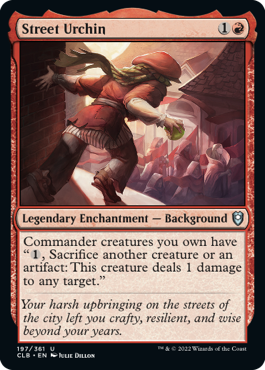
Street Urchin
{1}{R}
Legendary Enchantment — Background
Commander creatures you own have "{1}, Sacrifice another creature or an artifact: This creature deals 1 damage to any target."
- If your commander is an artifact creature, you may sacrifice it to pay the cost of this ability.
- If your commander that had the ability Street Urchin gave it somehow isn't a creature at the time the ability resolves, it will still deal 1 damage.
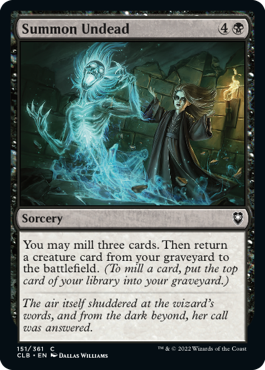
Summon Undead
{4}{B}
Sorcery
You may mill three cards. Then return a creature card from your graveyard to the battlefield. (To mill a card, put the top card of your library into your graveyard.)
- If you have fewer than three cards in your library, you can't choose to mill any cards this way.
- You return a creature card if there is one to return, even if you chose not to mill three cards.
- You can return a creature card that you milled or one that was already in your graveyard.
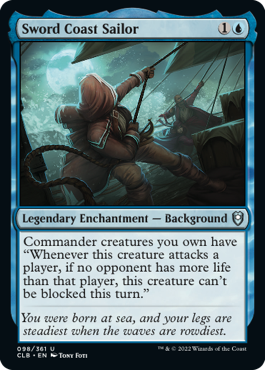
Sword Coast Sailor
{1}{U}
Legendary Enchantment — Background
Commander creatures you own have "Whenever this creature attacks a player, if no opponent has more life than that player, this creature can't be blocked this turn."
- The ability granted by Sword Coast Sailor is looking to see if any of the attacking player's opponents have a higher life total than that defending player. The attacking player's life total is not included in this comparison.
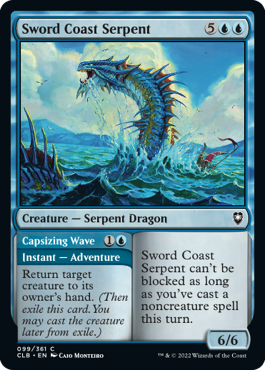
Sword Coast Serpent
{5}{U}{U}
Creature — Serpent Dragon
6/6
Sword Coast Serpent can't be blocked as long as you've cast a noncreature spell this turn.
//
Capsizing Wave
{1}{U}
Instant — Adventure
Return target creature to its owner's hand. (Then exile this card. You may cast the creature later from exile.)
- Casting a noncreature spell after Sword Coast Serpent has become blocked will not cause it to become unblocked.
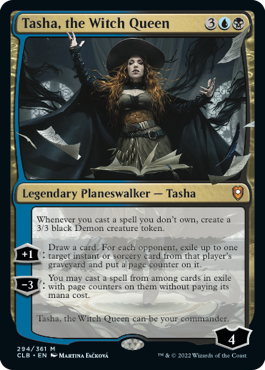
Tasha, the Witch Queen
{3}{U}{B}
Legendary Planeswalker — Tasha
4
Whenever you cast a spell you don't own, create a 3/3 black Demon creature token.
+1: Draw a card. For each opponent, exile up to one target instant or sorcery card from that player's graveyard and put a page counter on it.
−3: You may cast a spell from among cards in exile with page counters on them without paying its mana cost.
Tasha, the Witch Queen can be your commander.
- You may cast a spell from among the exiled cards only as Tasha's last loyalty ability resolves. You may not wait and cast spell from among them at a later time.
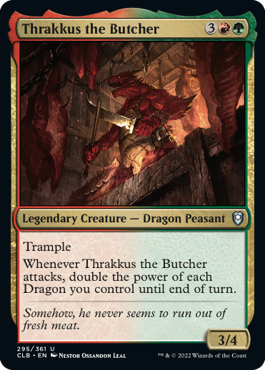
Thrakkus the Butcher
{3}{R}{G}
Legendary Creature — Dragon Peasant
3/4
Trample
Whenever Thrakkus the Butcher attacks, double the power of each Dragon you control until end of turn.
- To double a creature's power, that creature gets +X/+0, where X is the power of that creature as the triggered ability resolves.
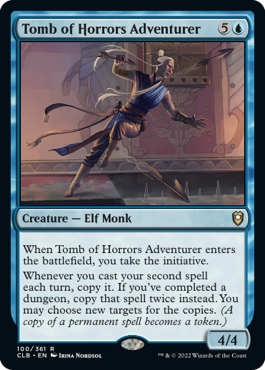
Tomb of Horrors Adventurer
{5}{U}
Creature — Elf Monk
4/4
When Tomb of Horrors Adventurer enters the battlefield, you take the initiative.
Whenever you cast your second spell each turn, copy it. If you've completed a dungeon, copy that spell twice instead. You may choose new targets for the copies. (A copy of a permanent spell becomes a token.)
- When the triggered ability of Tomb of Horrors Adventurer resolves, it creates one or two copies of a spell. You control each of the copies. Those copies are created on the stack, so they're not "cast." Abilities that trigger when a player casts a spell won't trigger. The copies will then resolve like normal spells, after players get a chance to cast spells and activate abilities.
- The triggered ability will copy the spell that caused it to trigger even if that spell has been countered by the time that ability resolves.
- Each of the copies will have the same targets as the spell it's copying unless you choose new ones. You may change any number of the targets, including all of them or none of them. If, for one of the targets, you can't choose a new legal target, then it remains unchanged (even if the current target is illegal). If there are multiple copies, you may change the targets of each of them to different legal targets.
- If the spell Tomb of Horrors Adventurer's ability copies is modal (that is, it has a bulleted list of choices), the copies will have the same mode(s). You can't choose different ones.
- If the spell Tomb of Horrors Adventurer copies has an X whose value was determined as it was cast (like Fireball does), the copy has the same value of X.
- You can't choose to pay any additional costs for the copies. However, effects based on any additional costs that were paid for the original spell are copied as though those same costs were paid for the copies too. For example, if you sacrifice a 3/3 creature to cast Fling and then copy it with Tomb of Horrors Adventurer, each copy of Fling will also deal 3 damage to its target.
- A resolving copy of a permanent spell becomes a token, so the token isn't "created." Effects that care about a token being created won't interact with a token that enters the battlefield because the triggered ability copied a permanent spell.
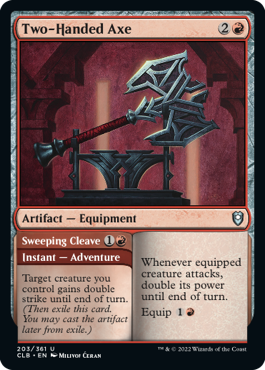
Two-Handed Axe
{2}{R}
Artifact — Equipment
Whenever equipped creature attacks, double its power until end of turn.
Equip {1}{R}
//
Sweeping Cleave
{1}{R}
Instant — Adventure
Target creature you control gains double strike until end of turn. (Then exile this card. You may cast the artifact later from exile.)
- To double a creature's power, that creature gets +X/+0, where X is that creature's power as the triggered ability resolves.
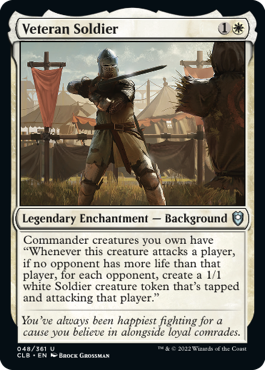
Veteran Soldier
{1}{W}
Legendary Enchantment — Background
Commander creatures you own have "Whenever this creature attacks a player, if no opponent has more life than that player, for each opponent, create a 1/1 white Soldier creature token that's tapped and attacking that opponent."
- The ability granted by Veteran Soldier is looking to see if any of the attacking player's opponents have a higher life total than that defending player. The attacking player's life total is not included in this comparison.
- Veteran Soldier has received an update to its Oracle text to clarify its function. Specifically, a Soldier creature token is created for each opponent of the controller of the attacking commander.
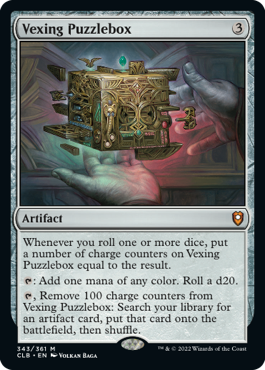
Vexing Puzzlebox
{3}
Artifact
Whenever you roll one or more dice, put a number of charge counters on Vexing Puzzlebox equal to the result.
{T}: Add one mana of any color. Roll a d20.
{T}, Remove 100 charge counters from Vexing Puzzlebox: Search your library for an artifact card, put that card onto the battlefield, then shuffle.
- If an effect instructs you to roll one or more dice and add some number to that roll, the result is the total after adding that number.
- If an effect instructs you to roll more than one die and ignore one or more of them, the result is only what wasn't ignored.
- In a game of Planechase, the result of rolling the planar die is not a number and does not cause Vexing Puzzlebox's first ability to put charge counters on it.
- Even though it includes rolling a die, Vexing Puzzlebox's second ability is a mana ability. It does not use the stack and cannot be responded to.
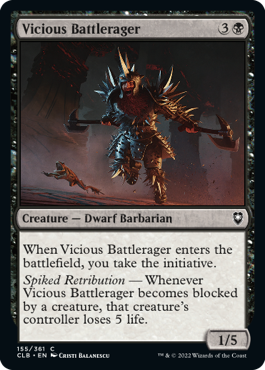
Vicious Battlerager
{3}{B}
Creature — Dwarf Barbarian
1/5
When Vicious Battlerager enters the battlefield, you take the initiative.
Spiked Retribution — Whenever Vicious Battlerager becomes blocked by a creature, that creature's controller loses 5 life.
- If Vicious Battlerager becomes blocked by more than one creature, its triggered ability triggers once for each creature that blocked it.
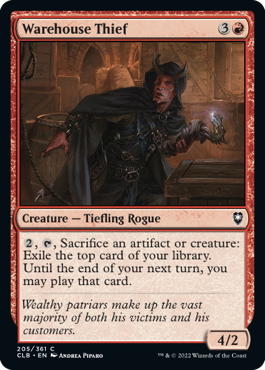
Warehouse Thief
{3}{R}
Creature — Tiefling Rogue
4/2
{2}, {T}, Sacrifice an artifact or creature: Exile the top card of your library. Until the end of your next turn, you may play that card.
- You must pay all costs and follow all timing rules when playing a land or casting a spell this way. For example, you may only play a land this way during your main phase while the stack is empty, and only if you haven't previously played a land this turn.
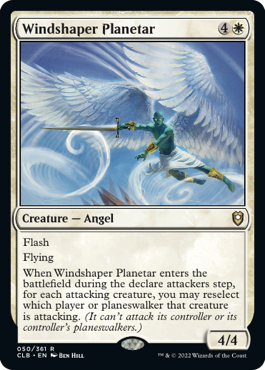
Windshaper Planetar
{4}{W}
Creature — Angel
4/4
Flash
Flying
When Windshaper Planetar enters the battlefield during the declare attackers step, for each attacking creature, you may reselect which player or planeswalker that creature is attacking. (It can't attack its controller or its controller's planeswalkers.)
- You may cast Windshaper Planetar outside of a declare attackers step. If Windshaper Planetar enters the battlefield outside of a declare attackers step, its ability simply doesn't trigger.
- Reselecting which player or planeswalker a creature is attacking ignores all requirements, restrictions, and costs associated with attacking.
- Reselecting which player or planeswalker a creature is attacking doesn't cause "whenever this creature attacks" abilities to trigger.
- If you reselect which player or planeswalker an attacking creature is attacking, that creature is still considered to have attacked the player or planeswalker as declared, but it is now attacking the new player or planeswalker.
- If an ability targets something controlled by the "defending player" of an attacking creature and the defending player for that creature changes before that ability resolves, the ability won't resolve because its target has become illegal.
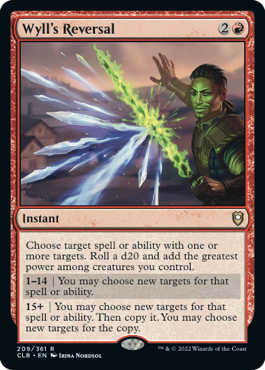
Wyll's Reversal
{2}{R}
Instant
Choose target spell or ability with one or more targets. Roll a d20 and add the greatest power among creatures you control.
1–14 | You may choose new targets for that spell or ability.
15+ | You may choose new targets for that spell or ability. Then copy it. You may choose new targets for the copy.
- Even though you do not gain control of the original spell or ability, you control the copy. That copy is created on the stack, so it isn't "cast." Abilities that trigger when a player casts a spell won't trigger. The copy will then resolve like a normal spell or ability, after players get a chance to cast spells and activate abilities. The copy will resolve before the original spell or ability.
- The copy will have the same targets as the spell or ability it's copying unless you choose new ones. You may change any number of the targets, including all of them or none of them. If, for one of the targets, you can't choose a new legal target, then it remains unchanged (even if the current target is illegal).
- If the target spell or ability is modal (that is, it has a bulleted list of choices), the copy will have the same mode(s). You can't choose different ones.
- If the target spell or ability has an X whose value was determined as it was cast, activated, or put on the stack (like Fireball does), the copy has the same value of X.
- You can't choose to pay any additional costs for the copy. However, effects based on any additional costs that were paid for the original spell or ability are copied as though those same costs were paid for the copy. For example, if you sacrifice a 3/3 creature to cast Fling and then copy it with Wyll's Reversal, the copy of Fling will also deal 3 damage to its target.
- If the spell is a permanent spell with a target (such as an Aura spell), and you create a copy of it, the copy will become a token that you control. Because the spell becomes a token, the token isn't "created." Effects that care about a token being created won't interact with a token that enters the battlefield because Wyll's Reversal copied a permanent spell.
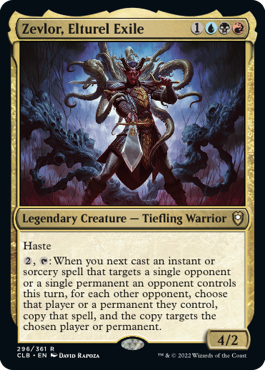
Zevlor, Elturel Exile
{1}{U}{B}{R}
Legendary Creature — Tiefling Warrior
4/2
Haste
{2}, {T}: When you next cast an instant or sorcery spell that targets only a single opponent or a single permanent an opponent controls this turn, for each other opponent, choose that player or a permanent they control, copy that spell, and the copy targets the chosen player or permanent.
- Zevlor, Elturel Exile has received an update to its Oracle text. The word "only" was inadvertently left off the printed card. The updated text is included above. Notably, an instant or sorcery spell with multiple targets will not cause the delayed triggered ability to trigger, even if only one of those targets is an opponent or an permanent an opponent controls.
- When the delayed triggered ability of Zevlor, Elturel Exile resolves, it may create one or more copies of a spell. You control each of the copies. Those copies are created on the stack, so they're not "cast." Abilities that trigger when a player casts a spell won't trigger. The copies will then resolve like normal spells, after players get a chance to cast spells and activate abilities.
- The delayed triggered ability can copy the spell that caused it to trigger even if that spell has been countered by the time that ability resolves.
- As you make your choices for each other opponent, you can choose that opponent or any permanent they control, but if the chosen player or permanent isn't a legal target for the spell, the copy won't be created.
- Like any spell, each copy will check to see if its target is still legal as it tries to resolve.
- If instant or sorcery spell could have multiple targets but only one target is chosen as it is cast, that spell will cause Zevlor's delayed triggered ability to trigger. The copies will similarly have only one target. For example, if you cast Explosive Entry ("Destroy up to one target artifact. Put a +1/+1 counter on up to one target creature") targeting only a creature, the copies can each legally target a single creature.
- If the spell is modal (that is, it has a bulleted list of choices), the copies will have the same mode(s). You can't choose different ones.
- If the spell has an X whose value was determined as it was cast (like Fireball does), the copy has the same value of X.
- You can't choose to pay any additional costs for the copies. However, effects based on any additional costs that were paid for the original spell are copied as though those same costs were paid for the copies too. For example, if you sacrifice a 3/3 creature to cast Fling and then copy it, each copy of Fling will also deal 3 damage to its target.
COMMANDER LEGENDS: BATTLE FOR BALDUR'S GATE COMMANDER CARD-SPECIFIC NOTES
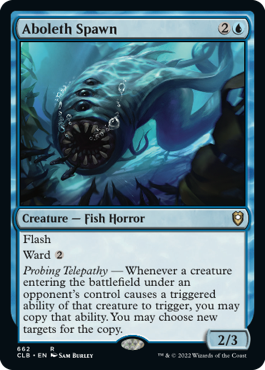
Aboleth Spawn
{2}{U}
Creature — Fish Horror
2/3
Flash
Ward {2}
Probing Telepathy — Whenever a creature entering the battlefield under an opponent's control causes a triggered ability of that creature to trigger, you may copy that ability. You may choose new targets for the copy.
- Triggered abilities use the words "when," "whenever," or "at." They're often written as "[Trigger condition],[effect]."
- Effects that modify how a creature enters the battlefield are not triggered abilities and are not affected by Aboleth Spawn's ability. These include (but aren't limited to) entering the battlefield as a copy of another permanent, entering the battlefield with counters, and entering the battlefield tapped.
- Aboleth Spawn's ability will always go on the stack on top of the entering creature's triggered ability that caused it to trigger. The copy it creates will be created on the stack on top of the entering creature's triggered ability and the copy will resolve before that ability.
- Aboleth Spawn's ability cares only about triggered abilities of the creature that's entering, not abilities of other permanents that trigger when that creature enters the battlefield.
- The copy will have the same targets as the ability it's copying unless you choose new ones. You may change any number of the targets, including all of them or none of them. If, for one of the targets, you can't choose a new legal target, then it remains unchanged (even if the current target is illegal).
- If the ability is modal (that is, it has a bulleted list of choices), the copy will have the same mode(s). You can't choose new ones.
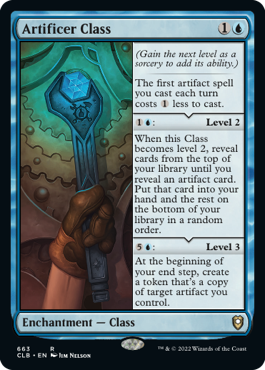
Artificer Class
{1}{U}
Enchantment — Class
(Gain the next level as a sorcery to add its ability.)
The first artifact spell you cast each turn costs {1} less to cast.
{1}{U}: Level 2
//Level_2//
When this Class becomes level 2, reveal cards from the top of your library until you reveal an artifact card. Put that card into your hand and the rest on the bottom of your library in a random order.
{5}{U}: Level 3
//Level_3//
At the beginning of your end step, create a token that's a copy of target artifact you control.
- Class is a returning enchantment type. Each Class has five abilities. The three in the major sections of its text box are class abilities. Class abilities can be static, activated, or triggered abilities. The other two are level abilities, one activated ability to advance the Class to level 2 and another to advance the Class to level 3.
- Each Class starts with only the first of three class abilities. As the first level ability resolves, the Class becomes level 2 and gains the second class ability. As the second level ability resolves, the Class becomes level 3 and gains the third class ability.
- Gaining a level won't remove abilities that a Class had at a previous level.
- Gaining a level is a normal activated ability. It uses the stack and can be responded to.
- You can't activate the first level ability of a Class unless that Class is level 1. Similarly, you can't activate the second level ability of a Class unless that Class is level 2.
- You can multiclass or even control multiple Class enchantments of the same class. Each Class permanent tracks its own level separately.
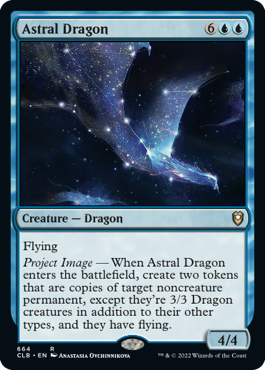
Astral Dragon
{6}{U}{U}
Creature — Dragon
4/4
Flying
Project Image — When Astral Dragon enters the battlefield, create two tokens that are copies of target noncreature permanent, except they're 3/3 Dragon creatures in addition to their other types, and they have flying.
- Except for power, toughness, types, and the flying ability, the token copies exactly what was printed on the original permanent and nothing else (unless that permanent is copying something else or is a token; see below). It doesn't copy whether that permanent is tapped or untapped, whether it has any counters on it or Auras and Equipment attached to it, and so on.
- If the copied permanent has {X} in its mana cost, X is considered to be 0.
- If the copied permanent is a token, the new token that's created copies the original characteristics of that token, with the exceptions noted above.
- If the copied permanent is copying something else, then the token enters the battlefield as whatever that permanent copied, with the exceptions noted above.
- Any enters-the-battlefield abilities of the copied permanent will trigger when the token enters the battlefield. Any "as [this permanent] enters the battlefield" or "[this permanent] enters the battlefield with" abilities of the chosen permanent will also work.
- If you target an Aura with Astral Dragon's ability, no tokens will be created.
- Since the tokens are creatures, they can't attack or {T} until your next turn if they don't have haste.
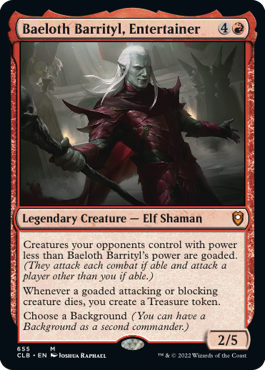
Baeloth Barrityl, Entertainer
{4}{R}
Legendary Creature — Elf Shaman
2/5
Creatures your opponents control with power less than Baeloth Barrityl's power are goaded. (They attack each combat if able and attack a player other than you if able.)
Whenever a goaded attacking or blocking creature dies, you create a Treasure token.
Choose a Background (You can have a Background as a second commander.)
- Unlike most similar effects, Baeloth Barrityl's first ability doesn't cause a creature to be goaded until your next turn. Rather, it causes it to be goaded for as long as Baeloth Barrityl is on battlefield, has the ability, and has sufficient power.
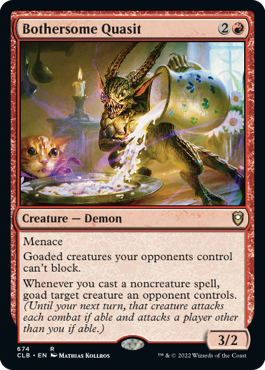
Bothersome Quasit
{2}{R}
Creature — Demon
3/2
Menace
Goaded creatures your opponents control can't block.
Whenever you cast a noncreature spell, goad target creature an opponent controls. (Until your next turn, that creature attacks each combat if able and attacks a player other than you if able.)
- Goading a creature after it has been declared as a blocker will not remove it from combat.
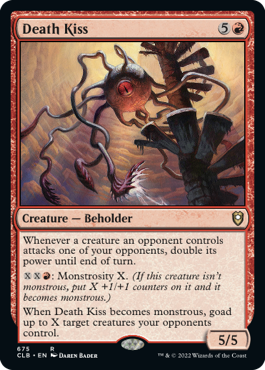
Death Kiss
{5}{R}
Creature — Beholder
5/5
Whenever a creature an opponent controls attacks one of your opponents, double its power until end of turn.
{X}{X}{R}: Monstrosity X. (If this creature isn't monstrous, put X +1/+1 counters on it and it becomes monstrous.)
When Death Kiss becomes monstrous, goad up to X target creatures your opponents control.
- To double a creature's power, it gets +X/+0, where X is its power as that ability resolves.
- Once a creature becomes monstrous, it can't become monstrous again. If the creature is already monstrous when the monstrosity ability resolves, nothing happens.
- Monstrous isn't an ability that a creature has. It's just something true about that creature. If the creature stops being a creature or loses its abilities, it will continue to be monstrous.
- An ability that triggers when a creature becomes monstrous won't trigger if that creature isn't on the battlefield when its monstrosity ability resolves.
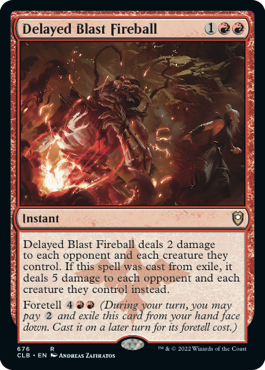
Delayed Blast Fireball
{1}{R}{R}
Instant
Delayed Blast Fireball deals 2 damage to each opponent and each creature they control. If this spell was cast from exile, it deals 5 damage to each opponent and each creature they control instead.
Foretell {4}{R}{R} (During your turn, you may pay {2} and exile this card from your hand face down. Cast it on a later turn for its foretell cost.)
- Delayed Blast Fireball deals 5 damage if it was cast from exile for any reason; it doesn't have to be from its foretell ability.
- Because exiling a card with foretell from your hand is a special action, you can do so any time you have priority during your turn, including in response to spells and abilities. Once you announce you're taking the action, no other player can respond by trying to remove the card from your hand.
- Casting a foretold card from exile follows the timing rules for that card. If you foretell an instant card, you can cast it as soon as the next player's turn. In most cases, if you foretell a card that isn't an instant (or doesn't have flash), you'll have to wait until your next turn to cast it.
- If you're casting a foretold card from exile for its foretell cost, you can't choose to cast it for any other alternative costs. You can, however, pay additional costs, such as kicker costs. If the card has any mandatory additional costs, those must be paid to cast the spell.
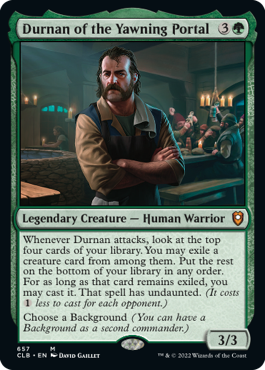
Durnan of the Yawning Portal
{3}{G}
Legendary Creature — Human Warrior
3/3
Whenever Durnan attacks, look at the top four cards of your library. You may exile a creature card from among them. Put the rest on the bottom of your library in any order. For as long as that card remains exiled, you may cast it. That spell has undaunted. (It costs {1} less to cast for each opponent.)
Choose a Background (You can have a Background as a second commander.)
- You must still pay all costs (as modified by the undaunted ability) and follow all normal timing rules when casting a spell this way.
- Causing an opponent to lose the game after you've announced that you're casting a spell with undaunted and determined its total cost won't cause you to have to pay more mana.
- Effects that reduce what you pay to cast a spell don't affect its mana value.
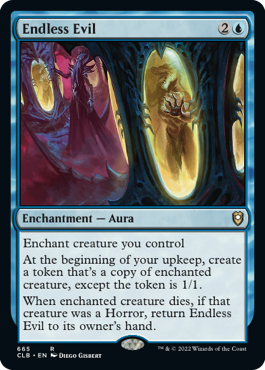
Endless Evil
{2}{U}
Enchantment — Aura
Enchant creature you control
At the beginning of your upkeep, create a token that's a copy of enchanted creature, except the token is 1/1.
When enchanted creature dies, if that creature was a Horror, return Endless Evil to its owner's hand.
- Except for power and toughness, the token copies exactly what was printed on the original creature and nothing else (unless that permanent is copying something else or it is a token; see below). It doesn't copy whether that creature is tapped or untapped, whether it has any counters on it or Auras and Equipment attached to it, and so on.
- If the copied creature has {X} in its mana cost, X is considered to be 0.
- If the copied creature is a token, the new token that's created copies the original characteristics of that token, with the exceptions noted above.
- If the copied creature is copying something else, then the token enters the battlefield as whatever that creature copied, with the exceptions noted above.
- Any enters-the-battlefield abilities of the copied creature will trigger when the token enters the battlefield. Any "as [this creature] enters the battlefield" or "[this creature] enters the battlefield with" abilities of the chosen creature will also work.
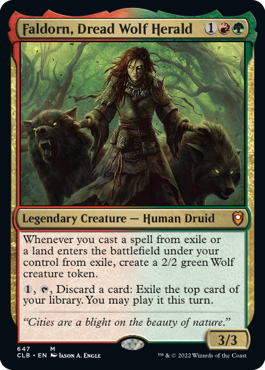
Faldorn, Dread Wolf Herald
{1}{R}{G}
Legendary Creature — Human Druid
3/3
Whenever you cast a spell from exile or a land enters the battlefield under your control from exile, create a 2/2 green Wolf creature token.
{1}, {T}, Discard a card: Exile the top card of your library. You may play it this turn.
- You must pay all costs and follow all normal timing rules for cards played this way. For example, you may only play a land from exile this way during your main phase while the stack is empty, and only if you haven't played a land yet this turn.
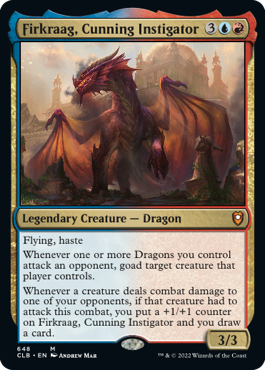
Firkraag, Cunning Instigator
{3}{U}{R}
Legendary Creature — Dragon
3/3
Flying, haste
Whenever one or more Dragons you control attack an opponent, goad target creature that player controls.
Whenever a creature deals combat damage to one of your opponents, if that creature had to attack this combat, you put a +1/+1 counter on Firkraag, Cunning Instigator and you draw a card.
- An ability that looks for whether a creature "had to attack" checks to see if there were any requirements to attack that were applying to that particular creature at the time it was declared as an attacker. If an ability required that creature's controller to attack rather than the creature itself (such as that of Trove of Temptation), that creature dealing combat damage won't cause Firkraag's last ability to trigger, even if it was the only creature that player could have attacked with to meet the requirement.
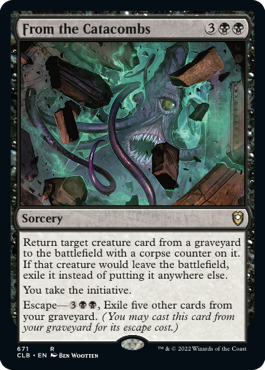
From the Catacombs
{3}{B}{B}
Sorcery
Put target creature card from a graveyard onto the battlefield under your control with a corpse counter on it. If that creature would leave the battlefield, exile it instead of putting it anywhere else.
You take the initiative.
Escape—{3}{B}{B}, Exile five other cards from your graveyard. (You may cast this card from your graveyard for its escape cost.)
- The corpse counter is only to help remind you which creatures will be exiled if they would leave the battlefield. If you somehow remove a corpse counter from a creature that was put onto the battlefield this way, the replacement effect that will exile it continues to apply. Similarly, moving the corpse counter onto another creature has no effect on that creature; the replacement effect will continue to apply to the original creature.
- Escape's permission doesn't change when you may cast the spell from your graveyard.
- To determine the total cost of a spell, start with the mana cost or alternative cost you're paying (such as an escape cost), add any cost increases, then apply any cost reductions. The mana value of the spell remains unchanged, no matter what the total cost to cast it was and no matter whether an alternative cost was paid.
- After From the Catacombs resolves, it returns to your graveyard. From there, you can use the escape ability to cast it again. Of course, you'll need five more cards to exile.
- If a card has multiple abilities giving you permission to cast it, such as two escape abilities or an escape ability and a flashback ability, you choose which one to apply. The others have no effect.
- If you cast a spell with its escape permission, you can't choose to apply any other alternative costs or to cast it without paying its mana cost. If it has any additional costs, you must pay those.
- If a card with escape is put into your graveyard during your turn, you'll be able to cast it right away if it's legal to do so, before an opponent can take any actions.
- Once you begin casting a spell with escape, it immediately moves to the stack. Players can't take any other actions until you're done casting the spell.
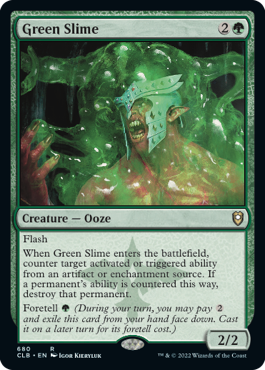
Green Slime
{2}{G}
Creature — Ooze
2/2
Flash
When Green Slime enters the battlefield, counter target activated or triggered ability from an artifact or enchantment source. If a permanent's ability is countered this way, destroy that permanent.
Foretell {G} (During your turn, you may pay {2} and exile this card from your hand face down. Cast it on a later turn for its foretell cost.)
- Activated abilities contain a colon. They're generally written "[Cost]: [Effect]." Some keywords are activated abilities and will have colons in their reminder text.
- Triggered abilities use the word "when," "whenever," or "at." They're often written as "[Trigger condition], [effect]."
- Mana abilities don't use the stack and can't be responded to, so they cannot be countered this way.
- Because exiling a card with foretell from your hand is a special action, you can do so any time you have priority during your turn, including in response to spells and abilities. Once you announce you're taking the action, no other player can respond by trying to remove the card from your hand.
- Casting a foretold card from exile follows the timing rules for that card. If you foretell Green Slime (or an instant card), you can cast it as soon as the next player's turn. In most cases, if you foretell a card that isn't an instant (or doesn't have flash), you'll have to wait until your next turn to cast it.
- If you're casting a foretold card from exile for its foretell cost, you can't choose to cast it for any other alternative costs. You can, however, pay additional costs, such as kicker costs. If the card has any mandatory additional costs, those must be paid to cast the spell.
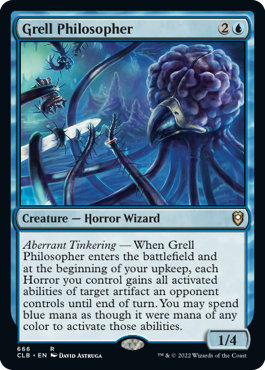
Grell Philosopher
{2}{U}
Creature — Horror Wizard
1/4
Aberrant Tinkering — When Grell Philosopher enters the battlefield and at the beginning of your upkeep, each Horror you control gains all activated abilities of target artifact an opponent controls until end of turn. You may spend blue mana as though it were mana of any color to activate those abilities.
- Grell Philosopher causes Horrors to gain only activated abilities. They don't gain keyword abilities (unless those keyword abilities are activated), triggered abilities, or static abilities.
- The granted abilities effectively use "this permanent" rather than "[that card's name]," so you treat the abilities as if they were printed on the creature that gained the ability. For example, say the artifact was Universal Solvent, which has the ability "{7}, {T}, Sacrifice Universal Solvent: Destroy target permanent." If Grell Philosopher gained that ability, you'd treat it as though it said "{7}, {T}, Sacrifice Grell Philosopher: Destroy target permanent."
- Activated abilities contain a colon. They're generally written "[Cost]: [Effect]." Some keywords are activated abilities and will have colons in their reminder text.
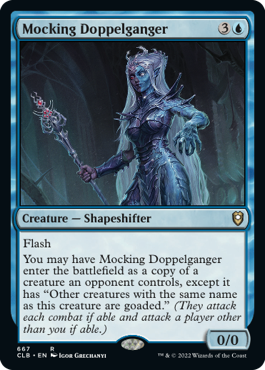
Mocking Doppelganger
{3}{U}
Creature — Shapeshifter
0/0
Flash
You may have Mocking Doppelganger enter the battlefield as a copy of a creature an opponent controls, except it has "Other creatures with the same name as this creature are goaded." (They attack each combat if able and attack a player other than you if able.)
- Except for the added ability, Mocking Doppelganger copies exactly what was printed on the original creature (unless that creature is copying something else or is a token; see below). It doesn't copy whether that creature is tapped or untapped, whether it has any counters on it, whether it has any Auras and/or Equipment attached to it, or any non-copy effects that changed its power, toughness, types, color, and so on.
- If the chosen creature has {X} in its mana cost, X is considered to be 0.
- If the chosen creature is a token, Mocking Doppelganger copies the original characteristics of that token, except for the added ability. Mocking Doppelganger doesn't become a token in this case.
- If the chosen creature is copying something else, Mocking Doppelganger will use the copiable values of the chosen creature. In most cases, it will be a copy of whatever the chosen creature is copying.
- Any enters-the-battlefield abilities of the copied creature will trigger when Mocking Doppelganger enters the battlefield. Any "as [this creature] enters the battlefield" or "[this creature] enters the battlefield with" abilities of the chosen creature will also work.
- If Mocking Doppelganger somehow enters the battlefield at the same time as another creature an opponent controls, it can't become a copy of that creature. You may choose only a creature that's already on the battlefield.
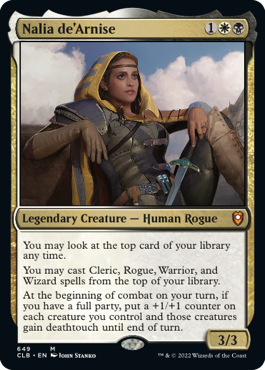
Nalia de'Arnise
{1}{W}{B}
Legendary Creature — Human Rogue
3/3
You may look at the top card of your library any time.
You may cast Cleric, Rogue, Warrior, and Wizard spells from the top of your library.
At the beginning of combat on your turn, if you have a full party, put a +1/+1 counter on each creature you control and those creatures gain deathtouch until end of turn.
- You can look at the top card of your library whenever you want (with one restriction; see below), even if you don't have priority. This action doesn't use the stack. Knowing what that card is becomes part of the information you have access to, just like you can look at the cards in your hand.
- If the top card of your library changes while you're casting a spell, playing a land, or activating an ability, you can't look at the new top card until you finish doing so. This means that if you cast a spell from the top of your library, you can't look at the next one until you're done paying for that spell.
- Nalia doesn't change when you can cast spells. Normally, this means during your main phase when the stack is empty, although flash may change this.
- You'll still pay all costs for the spell, including additional costs. You may also pay alternative costs if any are available.
- The top card of your library isn't in your hand, so you can't take other actions that would normally be allowed from your hand, such as discarding it due to an effect or activating a cycling ability.
- You have a "full party" if the number of creatures in your party is four (that is, you control a Cleric, a Rogue, a Warrior, and a Wizard, and they are four different creatures).
- Nalia's last ability will check whether you have a full party at the beginning of combat on your turn. If you don't, the ability won't trigger. If the ability does trigger, it will check again as it tries to resolve. If you don't have a full party at that time, the ability won't resolve and none of its effects will happen.
- After the last ability has resolved, no longer having a full party won't cause any of the creatures that gained deathtouch to lose it.
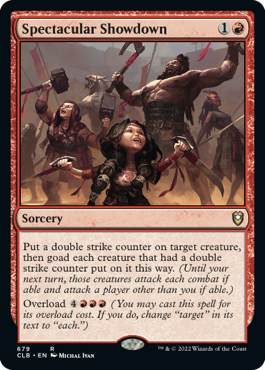
Spectacular Showdown
{1}{R}
Sorcery
Put a double strike counter on target creature, then goad each creature that had a double strike counter put on it this way. (Until your next turn, those creatures attack each combat if able and attack a player other than you if able.)
Overload {4}{R}{R}{R} (You may cast this spell for its overload cost. If you do, change "target" in its text to "each.")
- If you don't pay the overload cost of a spell, that spell will have a single target. If you pay the overload cost, the spell won't have any targets.
- Because a spell with overload doesn't target when its overload cost is paid, it may affect permanents with hexproof or with protection from the appropriate color.
- Overload doesn't change when you can cast the spell.
- Casting a spell with overload doesn't change that spell's mana cost. You just pay the overload cost instead.
- Effects that cause you to pay more or less for a spell will cause you to pay that much more or less while casting it for its overload cost, too.
- If you are instructed to cast a spell with overload "without paying its mana cost," you can't choose to pay its overload cost instead.
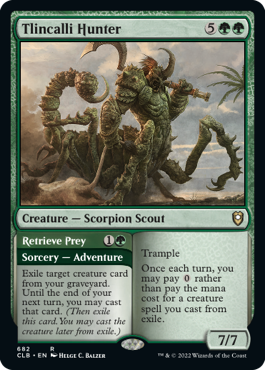
Tlincalli Hunter
{5}{G}{G}
Creature — Scorpion Scout
7/7
Trample
Once each turn, you may pay {0} rather than pay the mana cost for a creature spell you cast from exile.
//
Retrieve Prey
{1}{G}
Sorcery — Adventure
Exile target creature card from your graveyard. Until the end of your next turn, you may cast that card. (Then exile this card. You may cast the creature later from exile.)
- Tlincalli Hunter's ability doesn't give you permission to cast any spells from exile. You'll need to find another way to do that, such as Retrieve Prey.
- You must pay all costs and follow all normal timing rules when casting a creature card from exile with Retrieve Prey. Normally, this means you may only cast that card during a main phase of your turn while the stack is empty.
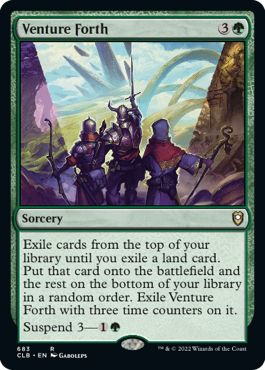
Venture Forth
{3}{G}
Sorcery
Exile cards from the top of your library until you exile a land card. Put that card onto the battlefield and the rest on the bottom of your library in a random order. Exile Venture Forth with three time counters on it.
Suspend 3—{1}{G}
- You can exile a card in your hand using suspend any time you could cast that card. Consider its card type, any effect that affects when you could cast it (such as flash) and any other effects that could stop you from casting it (such as Revel in Silence's effect) to determine if and when you can do this. Whether or not you could actually complete all steps in casting the card is irrelevant. For example, you can exile a card with suspend that has no mana cost or requires a target even if no legal targets are available at that time.
- Exiling a card with suspend isn't casting that card. This action doesn't use the stack and can't be responded to.
- If the first triggered ability of suspend (the one that removes time counters) is countered, no time counter is removed. The ability will trigger again during the card's owner's next upkeep.
- When the last time counter is removed, the second triggered ability of suspend will trigger. It doesn't matter why the last time counter was removed or what effect removed it.
- If the second triggered ability of suspend (the one that lets you cast the card) is countered, the card can't be cast. It remains exiled with no time counters on it, and it's no longer suspended.
- As the second triggered ability resolves, you must cast the card if able. Timing restrictions based on the card's type are ignored.
- If you can't cast the card, perhaps because there are no legal targets available, it remains exiled with no time counters on it, and it's no longer suspended.
Magic: The Gathering, Magic, Dungeons & Dragons, Baldur's Gate, and Adventures in Forgotten Realms are trademarks of Wizards of the Coast LLC in the USA and other countries. ©2022 Wizards.
